UK national
The UK National Lottery

The UK National LotteryP O Box 1010Liverpool, L70 1NL United Kingdom(Customer Services)Ref No: EAASL/94-6OYI-04Batch No: 11/6/DC34 BBNPhone: + 44 7700 30 90 23NATIONAL LOTTERY LUCKY PROGRAM #900 You have just won £1,000,000.00 [One Million Great Britishpounds Sterling]CONGRATULATIONS!!!CALL NOW TO CLAIM YOU’RE WINNING PRIZE YOUR CLAIM AGENT'S DIRECT CONTACT PHONE NUMBERLONDON, ENGLAND:+447700309023Dr. Richard AdamsCALL 24HRS, 7 DAYS A WEEK, INCLUDING SUNDAYS & HOLIDAYSCall Your Claim Agent NowAnd Also Send Him Email Message Immediately With The Bellow Email Address ToConfirm Your Winning:E-mail:Claimdeptt620@CS No: 680 NCA 85900Ref No: EAASL/94-6OYI-04Batch No: 11/6/DC34 BBNZonal Draw No: GMLA2-005Grand Draw No: 900WINNING NOTIFICATIONDear Sir/Madam,We are happy to announce to you winner of the draw of the Euro-Afro- American Sweepstake Lottery International programs held on the 6th JAN 2015, in Liverpool United Kingdom. Your e-mail address attached to ticket number B9564 75604545188with serial number 97560 drew the winning numbers:[2 - 9 - 22 - 23 - 24 - 30]bonus ball 6 which subsequently won you the lottery in the second category.(ct.02).You have therefore been approved to claim a total sum of BPS £ 1,000,000.00 (One Million British Pounds Starlings) in cash credited to file EAASL 30/10/02/0P1. This is from a total cash prize of BPS £52,000,000.00 {Fifty Two Million Great British Pound Starlings} shared amongst the first One Hundred and Thirty Four (134) lucky winners in this category worldwide.BRIEF CLARIFICATION: The Euro-Afro-American Sweepstake Lottery International program is held periodically to help encourage the worldwide usage of computer/internet as a tool of fast communication and learning. And hence email addresses were selected through computer balloting system. This program is co-sponsored by the United Kingdom National Lottery Board Liverpool in-collaborations with the MICROSFT COPORATIONS WORLD WIDE, owned by the American billionaire businessman Mr. Bill Gates.Please note that your lucky winning number falls within our European booklet representative office in London England, as indicated in your play coupon and your winning prize has been insured by the Federal Deposit Insurance Company (FDIC).In view of this, your BPS £ 1,000,000 .00 [One Million British Pounds Starlings]Would be released to you immediately you contact our agent office in London England where your winning number falls.Our London agent will immediately commence the process to facilitate the release of your funds as soon as you contact him. To file for your claim, please contact our fiduciary agent and discuss with him about his terms and conditions of assisting you to get your claim of BPS £1 Million without further delayContact Information:Dr. Richard Adams.+447700309023Regional ManagerLottery Subscribers Agents Europe, World Wide Internet Annual E-mail Promo,20 Craven Park, Harlesden London,NW10 United Kingdomrichardadames1441@Provide him with the information below:1. Name:2. Address:3.MaritalStatus:4.Occupation:5.Age:6.Sex:7.Nationality:8. Country of Residence:9.Telephone Number:10. Fax Number:11.Email Address:12. Draw Number above: 460-90013. Reference number: EAASL/94-6OYI-0414. Batch number: 11/6/DC34 BBN15. Scanned Page Of Your International Passport Or Driving Licence:16. Lottery Draw Date:Please be warned : For security reasons, you are advised to keep your winning information confidential till your claims is processed and your money remitted to youin whatever manner you deem fit to claim your prize. This is part of our precautionary measure to avoid double claiming and unwarranted abuse of this program by some unscrupulous elements.Please be informed that you should claim your winning prize on or before31st JAN 2015 to avoid unnecessary delays and complications, please quote your reference/batch numbers in any correspondences with our designated agents or us.IMPORTANT AND SERIOUSE WARNING: Please note that persons of 18 years and bellow are not allowed to gamble by the international gambling board unless supervised by older persons. In the case that they emerged winners in this lucky program they are advised to file for their claims by older persons/relatives. Congratulations once more from all members and staffs of Euro-Afro-American-Sweepstake Lottery. All replies and inquiries should be directed to your claim agent with the email addresses above to avoid complications. ENJOY YOUR WEALTH RESPONSIBLY!!!One of Our latest Second Quarter Winner Mrs. Jennifer Southa receiving her winning cheque, also on the picture is her husband and friends rejoicing with them while she popsChampaign.Yours Sincerely,Allan Teresa.United Kingdom Zonal Co-ordinator.Mr. Richard WatsonUnited Kingdom Zonal Secretary General.John BranscombeDirector of Security and Facilities。
主要国家英文名称汇总
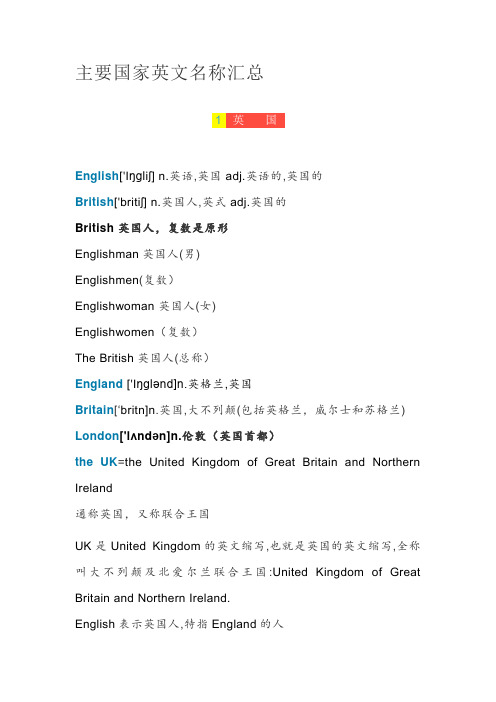
主要国家英文名称汇总1English['Iŋɡl iʃ] n.英语,英国adj.英语的,英国的British['britiʃ] n.英国人,英式adj.英国的British 英国人,复数是原形Englishman英国人(男)Englishmen(复数)Englishwoman 英国人(女)Englishwomen(复数)The British英国人(总称)England ['Iŋɡlənd]n.英格兰,英国Britain[‘britn]n.英国,大不列颠(包括英格兰,威尔士和苏格兰) London['lʌndən]n.伦敦(英国首都)the UK=the United Kingdom of Great Britain and Northern Ireland通称英国,又称联合王国UK是United Kingdom的英文缩写,也就是英国的英文缩写,全称叫大不列颠及北爱尔兰联合王国:United Kingdom of Great Britain and Northern Ireland.English表示英国人,特指England的人British表示英国人,主要指大不列颠Britain的英国人,而Britain是由England,Scotland,North Ireland和Welsh组成的,所以British也用于表示所有英国人British English英式英语American English美式英语2 美国America[ə'merikə] n.美洲,美国American[ə'merikən]adj.美国的,美洲的n.美国人,美洲人。
Americans (复数)The United States of America美利坚合众国即美国的全称,简称U.S.AThe United States 美国,简称U.SWashington['wɒʃIŋtən] n.华盛顿(首都).Amercia 有美国的意思,还有美洲的意思,包括南美洲,北美洲。
英国与美国政体区别
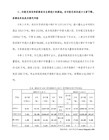
政府产生方式 总统任命 议会产生
国家权力中心 总统 议会
State governors serve four-year terms with about half up for election every two years
Thanks a lot.
But how about Britain?
Just be able to understand what's parliament
The parliament is bicameral, with an upper house, the House of Lords, and a lower house, the House of Commons.[1] The Queen is the third component of Parliament.[2][3] The House of Lords includes three different types of members: the Lords Spiritual (the senior bishops of the Church of England), the Lords Temporal (members of the Peerage), and Law Lords (judges that carry out the House of Lords' judicial responsibilities); its members are not elected by the population at large, but are appointed by the Queen on advice of the Prime Minister.[4] The House of Commons is a democratically elected chamber with elections to it held at least every 5 years.[5] The two Houses meet in separate chambers in the Palace of Westminster (commonly known as the "Houses of Parliament"), in the City of Westminster in London. By constitutional convention, all government ministers, including the Prime Minister, are members of the House of Commons or, less often, the House of Lords, and are thereby technically accountable to the respective branches of the legislature.
介绍英国的英语作文实用(5篇)
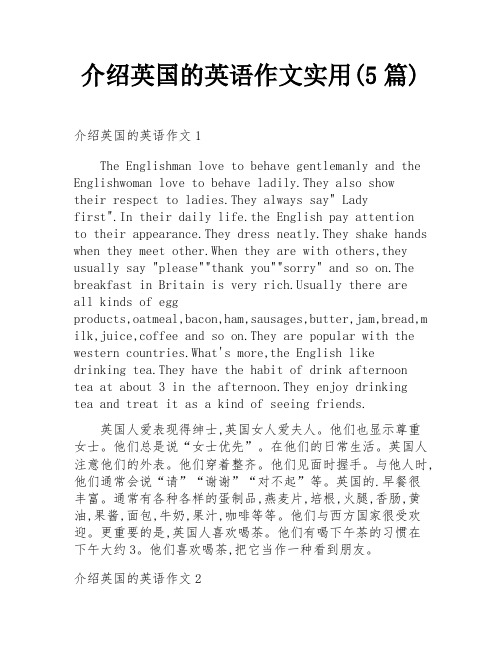
介绍英国的英语作文实用(5篇)介绍英国的英语作文1The Englishman love to behave gentlemanly and the Englishwoman love to behave ladily.They also showtheir respect to ladies.They always say" Ladyfirst".In their daily life.the English pay attention to their appearance.They dress neatly.They shake hands when they meet other.When they are with others,they usually say "please""thank you""sorry" and so on.The breakfast in Britain is very ually there areall kinds of eggproducts,oatmeal,bacon,ham,sausages,butter,jam,bread,m ilk,juice,coffee and so on.They are popular with the western countries.What's more,the English likedrinking tea.They have the habit of drink afternoon tea at about 3 in the afternoon.They enjoy drinking tea and treat it as a kind of seeing friends.英国人爱表现得绅士,英国女人爱夫人。
他们也显示尊重女士。
(完整word版)高考英语词汇3500词-乱序版
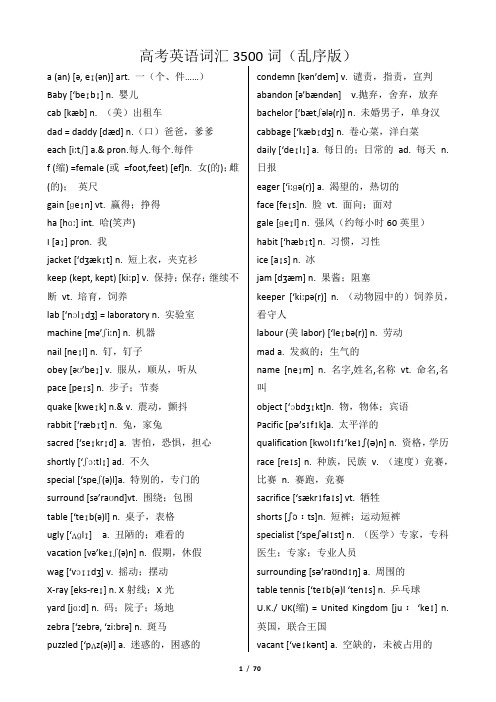
高考英语词汇3500词(乱序版)a (an) [ə, eɪ(ən)] art. 一(个、件……)Baby [‘beɪbɪ] n. 婴儿cab [kæb] n. (美)出租车dad = daddy [dæd] n.(口)爸爸,爹爹each [iːtʃ] a.& pron.每人.每个.每件f (缩) =female (或=foot,feet) [ef]n. 女(的);雌(的);英尺gain [ɡeɪn] vt. 赢得;挣得ha [hɑː] int. 哈(笑声)I [aɪ] pron. 我jacket [‘dʒækɪt] n. 短上衣,夹克衫keep (kept, kept) [kiːp] v. 保持;保存;继续不断vt. 培育,饲养lab [‘nɔlɪdʒ] = laboratory n. 实验室machine [mə’ʃiːn] n. 机器nail [neɪl] n. 钉,钉子obey [əʊ’beɪ] v. 服从,顺从,听从pace [peɪs] n. 步子;节奏quake [kweɪk] n.& v. 震动,颤抖rabbit [‘ræbɪt] n. 兔,家兔sacred [‘seɪkrɪd] a. 害怕,恐惧,担心shortly [‘ʃɔːtlɪ] ad. 不久special [‘speʃ(ə)l]a. 特别的,专门的surround [sə’raʊnd]vt. 围绕;包围table [‘teɪb(ə)l] n. 桌子,表格ugly [‘ʌɡlɪ] a. 丑陋的;难看的vacation [və’keɪʃ(ə)n] n. 假期,休假wag [‘vɔɪɪdʒ] v. 摇动;摆动X-ray [eks-reɪ] n. X射线;X光yard [jɑːd] n. 码;院子;场地zebra [‘zebrə, ‘ziːbrə] n. 斑马puzzled [‘pʌz(ə)l] a. 迷惑的,困惑的condemn [kən’dem] v. 谴责,指责,宣判abandon [ə’bændən] v.抛弃,舍弃,放弃bachelor [‘bætʃələ(r)] n. 未婚男子,单身汉cabbage [‘kæbɪdʒ] n. 卷心菜,洋白菜daily [‘deɪlɪ] a. 每日的;日常的ad. 每天n. 日报eager [‘iːɡə(r)] a. 渴望的,热切的face [feɪs]n. 脸vt. 面向;面对gale [ɡeɪl] n. 强风(约每小时60英里)habit [‘hæbɪt] n. 习惯,习性ice [aɪs] n. 冰jam [dʒæm] n. 果酱;阻塞keeper [‘kiːpə(r)] n. (动物园中的)饲养员,看守人labour (美labor) [‘leɪbə(r)] n. 劳动mad a. 发疯的;生气的name [neɪm] n. 名字,姓名,名称vt. 命名,名叫object [‘ɔbdʒɪkt]n. 物,物体;宾语Pacific [pə’sɪfɪk]a. 太平洋的qualification [kwɔlɪfɪ’keɪʃ(ə)n] n. 资格,学历race [reɪs] n. 种族,民族v. (速度)竞赛,比赛n. 赛跑,竞赛sacrifice [‘sækrɪfaɪs] vt. 牺牲shorts [ʃɔːts]n. 短裤;运动短裤specialist [‘speʃəlɪst] n. (医学)专家,专科医生;专家;专业人员surrounding [sə’raʊndɪŋ] a. 周围的table tennis [‘teɪb(ə)l ‘tenɪs] n. 乒乓球U.K./ UK(缩) = United Kingdom [juː‘keɪ] n.英国,联合王国vacant [‘veɪkənt] a. 空缺的,未被占用的wage [weɪdʒ] n. 工资,工钱,报酬yawn [jɔːn] v. 打哈欠zebra -crossing [‘zebrə-’krɔsɪŋ] 人行横道线(斑马线)attraction [ə’trækʃ(ə)n] n. 吸引,爱慕professor [prə’fesə(r)] n. 教授ability [ə’bɪlɪtɪ] n. 能力;才能back [bæk] ad. 回(原处);向后a. 后面的n. 背后,后部;背café [‘kæfeɪ; (US) kæ’feɪ] n. 咖啡馆;餐馆dam [dæm] n. 水坝,堰堤eagle [‘iːɡ(ə)l] n. 鹰facial [‘feɪʃ(ə)l] a. 面部用的gallery [‘ɡælərɪ] n. 画廊;美术品陈列室hair [heə(r)] n. 头发ice--cream [aɪs- kriːm] n. 冰淇淋January [‘dʒænjʊərɪ; (US) ‘dʒænjʊerɪ] n. 1月kettle [‘ket(ə)l] n. (烧水用的)水壶labourer (laborer) ['leibərə] n.体力劳动者madam/ madame [‘mædəm] n. 夫人,女士narrow [‘nærəʊ] a. 狭窄的observe [əb’zɜːv]v. 观察,监视,观测the Pacific Ocean [ðə pə’sɪfɪk’əʊʃ(ə)n] 太平洋quality [‘kwɔlɪtɪ] n. 质量,性质racial [‘reɪʃ(ə)l] a. 种族的sad [sæd] a. (使人)悲伤的short wave [ʃɔːt] [weɪv]n. 短波specific [spɪ’sɪfɪk]a.明确的,具体的,独特的survival [sə’vaɪv(ə)l] n. 存活,幸存tablet’tenɪs n. 药片umbrella [ʌm’brelə] n. 雨伞vague [veɪɡ] a. 含糊的,紧迫的waist [weɪst] n. 腰,腰部,腰围year [jɪə(r), jəː(r)] n. 年zero [‘zɪərəʊ] n. & num.零,零度,零点control [kən’trol] vt.& n. 控制artist [‘ɑːtɪst] n.艺术家able [‘eɪb(ə)l] a. 能够;有能力的backache [‘bækeɪk] n. 背痛cafeteria [kæfɪ’tɪərɪə] n. 自助餐厅damage [‘dæmɪdʒ] n.& vt. 毁坏,损害ear [ɪə(r)] n.耳朵.耳状物;听力,听觉fact [fækt]n. 事实,现实gallon [‘ɡælən] n. 加仑haircut [‘heəkʌt] n. (男子)理发Iceland [‘aɪslənd] * n. 冰岛Japan [dʒæ’pæn] * n. 日本key [kiː] n. 钥匙;答案;键;关键lack [læk] n.& vt. 缺乏,缺少magazine [mæɡə’ziːn] n. 杂志nation [‘neɪʃ(ə)n] n. 民族,国家obtain [əb’teɪn] vt. 获得;得到pack [pæk] n. 包,捆;(猎犬、野兽的)一群v.(为运输或储存而)打包quantity [‘kwɔntətɪ] n. 量,数radiation [reɪdɪ’eɪʃ(ə)n] n. 放射,放射物sadness [‘sædnɪs] n. 悲哀,忧伤shot[ʃɔt] n. 射击,开枪,开炮,射击声;子弹speech [spiːtʃ]n. 演讲survive [sə’vaɪv] v.生存,存活,幸免于难tail [teɪl] n. (动物的)尾巴U.N./ UN(缩) = the United Nations [juː‘ən] n. 联合国vain [veɪn] n. 自负的,自视过高的,徒劳的,无效的wait [weɪt] vi. 等,等候yell [jel] v. 叫喊,吼叫zip [zɪp] v.& n.拉开(或扣上)……的拉链;拉链pyramid [‘pɪrəmɪd] n. 角锥形,金字塔the butterfly 蝶泳abnormal [æb’nɔːm(ə)l] a. 反常的,变态的background [‘bækɡraʊnd] n. 背景cage [keɪdʒ] n 笼;鸟笼damp [dæmp] a. & n. 潮湿(的)early [ɜːlɪ] a. 早的ad. 早地factory n. 工厂game [ɡeɪm] n. 游戏;运动;比赛half [hɑːf; (US) hæf] a.& n. 半,一半,半个idea [aɪ’dɪə] n. 主意,意见,打算,想法Japanese [dʒæpə’niːz] a. 日本的,日本人的,日语的n. 日本人,日语keyboard [kiːbɔːd] n. 键盘ladder [‘lædə(r)] r n. 梯子magic [‘mædʒɪk] a. 有魔力的national [‘næʃən(ə)l] a. 国家的,全国性的,民族的obvious [‘ɔbvɪəs] a. 显然package [‘pækɪdʒ] n. (尤指包装好或密封的容器)一包,一袋,一盒quarrel [‘kwɔrəl; (US) ‘kwɔːrəl] vi. 争吵,吵架radio [reɪdɪəʊ] n. 无线电,收音机safe [seɪf] a. 安全的n. 保险柜should[ʃɔt] v. mod. 应当,应该,会v. aux.会,应该(shall的过去时态)speed [spiːd] n. 速度v. (使)加速suspect [sə’spekt] n. 犯罪嫌疑人tailor [‘teɪlə(r)] n. 裁缝unable [juː‘ən] a.不能的,不能胜任的valid [‘vælɪd] a.有效的,合理的,有根据的waiter [‘weɪtə(r)] n. (餐厅)男服务员yellow [‘jeləʊ] a. 黄色的zip code(美) =postcode [zɪp kəʊd] (英)邮政区号attractive [ə’træktɪv] a. 迷人的,有吸引力的conduct [‘kɔndʌkt] vt. 引导,带领aboard [ə’bɔːd] prep. 上(船,飞机,火车,汽车等)backward(s) [‘bækwəd] ad. 向后calculate [‘kælkjʊleɪt] v. 计算,核算,推测dance [dɑːns; (US) dæns] n.& vi. 跳舞earn [ɜːn]vt. 挣得,赚得fade [feɪd] vi. 褪色,(颜色)消退garage [‘ɡærɑːʒ, -rɪdʒ; (US) ɡə’rɑːʒ] n. 汽车间(库)hall [hɔːl] n. 大厅,会堂,礼堂;过道identity [aɪ’dentɪtɪ] n. 身份,特征jar [dʒɑː(r)] n. 罐子;坛子kick [kɪk] v.& n. 踢lady [‘leɪdɪ] n. 女士,夫人maid [meɪd] n. 女仆;侍女nationality [næʃə’nælətɪ] n. 国籍occupation [ɔkjʊ’peɪʃ(ə)n] n. 职业,工作packet [‘pækɪt] n. 小包裹,袋quarter [‘kwɔːtə(r)] n. 四分之一,一刻钟radioactive [reɪdɪəʊ’æktɪv] a. 放射性的safety [‘seɪftɪ] n. 安全,保险shoulder [‘ʃəʊldə(r)]n. 肩膀,(道路的)路肩spell [spiːd]vt. 拼写suspension [sə’spenʃ(ə)n] n.暂令停职,推迟,延期take (took, taken) [teɪk] vt. 拿;拿走;做;服用;乘坐;花费unbearable [ʌn’beərəb(ə)l] a.难耐得,无法接受的valley [‘vælɪ] n. 山谷, 溪谷waiting -room [‘weɪtɪŋ- rʊm] n.候诊室,候车室yes [jes] ad. 是,好,同意zipper [‘zɪpə(r)] n. 拉链controversial [kɔntrə’vɜːʃ(ə)l] a.引起争论的,有争议的profit [‘prɔfɪt] n. 利润,收益abolish [ə’bɔlɪʃ] v. 废除,废止bacon [‘beɪkən] n. 咸猪肉;熏猪肉cake [keɪk] n. 蛋糕,糕点;饼danger [‘deɪndʒə(r)] n. 危险earth [ɜːθ] n. 地球;土,泥;大地fail [feɪl] v. 失败;不及格;衰退garbage [‘ɡɑːbɪdʒ] n. 垃圾ham [hæm] n. 火腿identification [aɪdentɪfɪ’keɪʃ(ə)n] n. 鉴定,辨别jaw [dʒɔː] n. 下巴kid [kɪd] n. 小孩lake [leɪk] n. 湖mail [meɪl] n. 邮政,邮递v. (美)邮寄nationwide [‘neɪʃ(ə)nwaɪd] ad.全国范围内的,全国性的occur [ə’kɜː(r)] vi. 发生paddle [‘pæd(ə)l] n. 桨状物,蹼queen [kwiːn] n. 皇后,女王radium [‘reɪdɪəm] n. 镭sail [seɪl] n. 航行v. 航行,开航shout [‘ʃəʊldə(r)] n.& v. 喊,高声呼喊spelling [‘spelɪŋ] n. 拼写,拼读swallow [‘swɔləʊ] vt. 吞下;咽下tale [teɪl] n. 故事, 传说unbelievable [ʌnbɪ’liːvəb(ə)l] a.难以置信的valuable [‘væljʊəb(ə)l] a. 值钱的,贵重的waitress [tres] n. 女服务员yesterday [‘jestədeɪ] n.& ad. 昨天zone [zuː] n. 区域;范围audience [‘ɔːdɪəns] n. 观众,听众as [əz, æz] ad.& conj.像……一样;如同;因为prep. 作为,当做abortion [ə’bɔːʃ(ə)n] v. 人工流产,堕胎bacterium [bæk’tɪərɪəm] (复bacteria) n. 细菌call [kɔːl] n. 喊,叫;电话,通话v. 称呼;呼唤;喊,叫dangerous [‘deɪndʒərəs] a. 危险的earthquake [‘ɜːθkweɪk] n. 地震failure [‘feɪljə(r)] n. 失败garden [‘ɡɑːd(ə)n] n. 花园,果园,菜园hamburger [‘hæmbɜːɡə(r)] n. 汉堡包idiom [‘ɪdɪəm] n. 习语,成语jazz [dʒæz] n. 爵士音乐,爵士舞曲kill [kɪl] v. 杀死,弄死lamb [læm] n. 羔羊mailbox ['meɪlbɒks] n. 邮筒;邮箱native [‘neɪtɪv] a. 本土的,本国的ocean [‘əʊʃ(ə)n]n. 海洋page [peɪdʒ] n. 页,页码question [‘kwestʃ(ə)n] vt. 询问n. 问题rag [ræɡ] n. 破布,抹布sailing [‘seɪlɪŋ] n. 航海show [ʃəʊ]n. 展示,展览(会);演出spend (spent, spent) [‘spelɪŋ] v. 度过;花费(钱、时间等)swap [swɔp] v. 交换(东西)talent [‘tælənt] n. 天才,天赋uncertain [‘sɜːt(ə)n] a.不确定的value [‘væljuː] n. 价值,益处wake (woke, woken) [weɪk] v.醒来,叫醒yet [jet] ad. 尚,还,仍然zoo [zuː] n. 动物园convenience [kən’viːnɪəns] n. 便利button [‘bʌt(ə)n] n. 纽扣;(电铃等的)按钮v. 扣(纽扣)about [ə’baʊt] ad. 大约;到处;四处prep. 关于;在各处;四处bad (worse, worst) [bæd] a. 坏的;有害的,不利的;严重的calm [kɑːm; (US) kɑːlm] a. 镇静,沉着的v.镇静沉着dare [deə(r)] v.& aux..(后接不带to的不定式;主要用于疑问,否定或条件句)敢,敢于ease [iːz]v. 减轻;缓解(难度或严重程度)fair [feə(r)] a. 公平的,合理的a. (肤色)白皙的;(人)白肤金发的n. 集市;庙会;展览会gardening [‘ɡɑːdnɪŋ] n. 园艺学hammer ['hæmə(r)] n. 锤子,锣锤if [ɪf] conj.如果,假使,是否,是不是jeans [dʒiːns] n. 牛仔裤kilo [‘kiːləʊ] n. 千克;千米lame [leɪm] a. 跛的,瘸的,残废的main [meɪn] a. 主要的natural [‘nætʃər(ə)l] a. 自然的Oceania* n. 大洋洲pain [peɪn] n. 疼痛,疼questionnaire [kwestʃə’neə(r)] n. 调查表,问卷rail [reɪl] n. 铁路sailor [‘seɪlə(r)] n. 水手,海员show [ʃəʊ] (showed, shown 或showed) v. 给…看,出示,显示spin [spɪn]v.& n. 纺,(使)快速旋转;旋转,旋转运动swear (swore, sworn) [sweə(r)] v.咒骂.,诅咒talk [tɔːk] n.& v.谈话,讲话,演讲,交谈uncle [‘ʌŋk(ə)l] n. 叔,伯,舅,姑夫,姨父vanilla [və’nɪlə] n. 香草walk [wɔːk] n.& v. 步行;散步yoghurt ['jɔgət,'jəʊ-] n. 酸奶zoom [zuːm] v. 快速移动,迅速前往,猛涨authentic [ɜː’θentɪk] a. 真正的,真品的conductor [kən’dʌktə(r)] n. 管理人;指导者;(车上的)售票员,列车员;乐队指挥above [ə’bʌv] prep. 在……上面a. 上面的ad. 在……之上badly [‘bædlɪ] ad. 坏,恶劣地camel [‘kæm(ə)l] n. 骆驼dark [dɑːk] n. 黑暗;暗处;日暮a. 黑暗的;暗淡的;深色的easily [‘iːzɪlɪ] ad. 容易地fairly [‘feəlɪ] ad. 公正地,正当地;相当(程度)地garlic [‘ɡɑːlɪk] n. 大蒜hand [hænd] n. 手;指针v. 递;给;交付交上;交进ignore [ɪɡ’nɔː(r)] v. 忽视,对…不理会jeep [dʒiːp] n. 吉普车kilogram [‘kɪləɡræm] n. 千克lamp [læmp] n. 灯,油灯;光源mainland [‘meɪnlənd] n. 大陆nature [‘neɪtʃə(r)] n. 自然, 性质,种类o'clock[ə’klɔk] n. 点钟painful [‘peɪnfʊl] a. 使痛的,使痛苦的queue [kjuː] n. 行列,长队railway [‘reɪlweɪ] n. 铁路;铁道salad [‘sæləd] n. 色拉(西餐中的一种菜)shower [‘ʃaʊə(r)] n. 阵雨;淋浴spirit [‘spɪrɪt]n. 精神sweat [swet] n. 汗,汗水tall [tɔːl] a. 高的uncomfortable [ʌn’kʌmftəb(ə)l] a. 令人不舒服的variety [və’raɪətɪ] n. 种种,种类walkman [‘wɔːkmən] n. 随身听you [juː, jʊ] pron. 你;你们convenient [kən’viːnɪənt] a. 便利的,方便的programme (美program) n. 节目;项目abroad [ə’brɔːd] ad. 到(在)国外badminton [‘bædmɪntən] n. 羽毛球camera [‘kæmərə] n. 照相机;摄像机darkness [‘dɑːknɪs] n. 黑暗,阴暗east [iːst]a. 东方;东部的;朝东的;从东方来ad. 在东方;向东方;从东方n. 东,东方;东部fairness ['fɛənis] n. 公平;公正garment [‘ɡɑːmənt] n. (一件)衣服handbag [‘hændbæɡ] n. 女用皮包,手提包ill [ɪl] a. 有病的;不健康的jet [dʒet] n. 喷气式飞机;喷射(器)kilometr ['kiləʊmi:tə(r)] e n. 千米(公里)land [lænd] n.陆地,土地v.登岸(陆)降落majo r [‘meɪdʒə(r)] a. 较大的;主要的navy [‘neɪvɪ] n. 海军October [ɔk’təʊbə(r)] n. 10月paint [peɪnt] n.油漆vt.油漆,粉刷,绘画quick [kwɪk] a. 快;敏捷的;急剧的ad. 快地;敏捷地;急剧地rain [reɪn] n. 雨,雨水vi. 下雨salary [‘sælərɪ] n. 薪金,薪水shrink (shrank, shrunk / shrunk, shrunken) [ʃrɪŋk]v. 缩小,收缩,减少spiritual [‘spɪrɪtʃʊəl]a. 精神的;心灵的sweater [‘swetə(r)]n. 厚运动衫,毛衣tank [tæŋk] n. 储水容量;坦克unconditional [ʌnkən’dɪʃən(ə)l] a.无条件,绝对的various [‘veərɪəs] a. 各种各样的,不同的wall [wɔːl] n. 墙young [jʌŋ] a. 年轻的author [‘ɔːθə(r)] n. 作者,作家ash [æʃ] n. 灰;灰末abrupt [ə’brʌpt] a. 突然的,意外的,粗鲁bag [bæɡ] n. 书包;提包;袋子camp [kæmp] n.(夏令)营vi.野营,宿营dash [dæʃ] v. & n. 快跑,冲刺,短跑Easter [‘iːstə(r)] n. 复活节faith [feɪθ] n. 信仰;信念gas [ɡæs] n. 煤气handful [‘hændfʊl] n.(一)把;少数,少量illegal [ɪ’liːɡ(ə)l] a. 非法的jewel [‘dʒuːəl] n. 宝石kind [kaɪnd] n. 种;类a. 善良,友好的language [‘læŋɡwɪdʒ] n. 语言majority [mə’dʒɔrɪtɪ] n. 大多数near [nɪə(r)] a. 近的ad. 附近,邻近prep. 在……附近,靠近of [ɔv, əv; (US) ɔːf]prep.(表所属,数量,) ….的painter [‘peɪntə(r)] n. 绘画者,(油)画家quiet [‘kwaɪət] a. 安静的;寂静的rainbow [‘reɪnbəʊ] n. 虹,彩虹sale [seɪl] n. 卖,出售shut (shut, shut) [ʃʌt]v. / n. 关上,封闭;禁闭;spit [spɪt]v. 吐唾沫;吐痰sweep(swept,swept) [swiːp] v. 扫除,扫tanker [‘tæŋkə(r)] n. 油船unconscious [ʌn’kɔnʃəs] a.昏迷,不省人事的vase [vɑːz; (US) veɪs] n. (花)瓶;瓶饰wallet [‘wɔlɪt] n. (放钱,证件等的)皮夹your [jʌŋ] pron. 你的;你们的conventional [kən’venʃən(ə)l] a. 依照惯例的,习惯的buy (bought,bought) [baɪ] vt. 买absence [‘æbsəns] n. 不在,缺席baggage [‘bæɡɪdʒ] n. 行李campaign [kæm’peɪn] n. 运动,战役data [‘deɪtə, ‘dɑːtə; (US) ‘dætə] n. 资料,数据eastern [‘iːst(ə)n] a. 东方的;东部的fall [fɔːl] n. (美)秋季gate [ɡeɪt] n. 大门handkerchief [‘hæŋkətʃɪf] n. 手帕illness [‘ɪlnɪs] n. 疾病jewelry [‘dʒuːəlrɪ] n. (总称)珠宝kindergarten [kɪndə’ɡɑːt(ə)n] n. 幼儿园lantern [‘læntən] n. 灯笼;提灯make (made,made) [meɪk] vt.制造,做;使得n. 样式;制造nearby [‘nɪəbaɪ] a. 附近的off [‘ɔf; (US) ɔːf] prep. 离开,脱离,(走)开painting [‘peɪntɪŋ] n. 油画,水彩画quilt [kwɪlt] n. 被子;被状物raincoat [‘reɪnkəʊt] n. 雨衣salesgirl [‘seɪlzɡɜːl] n. 女售货员shuttle [‘ʃʌt(ə)l] vn. 合拢(往返与两个定点之间的)(火车汽车飞机)班车/机splendid[‘splendɪd] a. 灿烂的,辉煌的;(口语)极好的sweet [swiːt] n.甜食;蜜饯;甜点;糖果;芳香a.甜的;新鲜的;可爱的;亲切的tap [tæp] n. (自来水煤气等的)龙头under [‘ʌndə(r)] ad.& prep.在…下面,向…下面vast [vɑːst; (US) væst] a. 巨大的,广阔的walnut [‘wɔːlnʌt] n. 核桃,胡桃yours [jɔːz, jʊəz] pron. 你的;你们的authority [ɔː’θɔrɪtɪ] n.权力,权威,威信,官方confident [‘kɔnfɪdənt] a. 自信的absent [‘æbsənt] a. 缺席,不在bake [beɪk] v. 烤;烘(面包)can (could) can't = can not modal [ken, kæn] v. 可能;能够;可以不能n.(美)罐头;罐子database [‘deɪtbeɪs] n. 资料库,数据库eastwards [‘iːstwədz] ad. 向东fall [fɔːl] (fell, fallen) vi. 落(下),降落;倒gather [‘ɡæðə(r)] v. 聚集;采集handle [‘hæn d(ə)l] n. 柄,把柄v. 处理imagine [ɪ’mædʒɪn] vt. 想像,设想job [dʒɔb] n. (一份)工作kind-hearted [kaɪnd- 'hɑ:tid] a. 好心的lap [læp] n. (人坐时)膝部.(跑道的)一圈male [meɪl] a. 男(性)的;雄的nearly [‘nɪəlɪ] ad. 将近,几乎ad[æd].离开;(电自来水)停了,中断pair [peə(r)] n. 一双,一对quit [kwɪt] v. 离任,离校,戒掉rainfall [‘reɪnfɔːl] n. 一场雨;降雨量salesman [‘seɪlzmən] n. 男售货员shyv [ʃaɪ] a. 害羞的split [splɪt] v. 撕开;切开swell (swelled, swollen) [swel] v. 肿胀tape [teɪp] n. 磁带;录音带underground [ʌndə’ɡraʊnd] a.地下的n. 地铁VCD = versatile compact disk n. 影碟光盘wander [‘wɔndə(r)] vi.漫游,游荡,漫步,流浪yourself [jɔː’self; (US) jʊər’self] pron. 你自己conversation [kɔnvə’seɪʃ(ə)n] n. 谈话,交谈progress [‘prəʊɡres; (US) ‘prɔɡres] n.进步,上进vi.进展,进行absolute [‘æbsəluːt] a. 完全,全部,绝对的bakery [‘beɪkərɪ] n. 面包店a garbage can [‘ɡɑːbɪdʒ](美)垃圾桶date [deɪt] n. 日期;约会n.枣easy [‘iːzɪ] a. 容易的,不费力的false [fɔːls] a. 不正确的;假的gay [ɡeɪ] a. (男)同性恋的;快活的,愉快的handsome [‘hænsəm] a. 英俊的immediate [ɪ’miːdɪət] a. 立即的,马上jog [dʒɔɡ] v. 慢跑kindness [‘kaɪndnɪs] n. 仁慈;善良large [lɑːdʒ] a. 大的;巨大的man (复men) [mæn] n. 成年男人;人类neat [niːt] a. 整洁的;灵巧的offence[of·fence || ə'fens] n. 违法行为,犯罪palace [‘pælɪs] n. 宫,宫殿quite [kwaɪt] ad. 完全,十分rainy [‘reɪnɪ] a. 下雨的;多雨的saleswoman [seɪlz‚wʊmən] n. 女售货员sick [sɪk] a.有病,患病的,(想)呕吐spoken [‘spəʊkən] a. 口语的swift [swɪft] a. 快的,迅速的tape recorder [teɪp rɪ’kɔːdə(r)] n. 磁带录音机underline [ʌndə’laɪn] v. 在…下划线veal [viːl] n. (食用)小牛肉want [wɔnt; (US) wɔːnt] vt. 想,想要,需要,必要yourselves [jɔː’self; (US) jʊər’self] pron. 你们自己automatic [ɔːtə’mætɪk] a. 自动的,机械的ashamed [ə’ʃeɪmd] a. 惭愧;害臊absorb [əb’sɔːb] v. 吸收,使全神贯注balance [‘bæləns] n. 平衡a can opener [‘əʊpənə(r)] 开罐器daughter [‘dɔːtə(r)] n. 女儿easy--going [‘iːzɪ-’ɡəʊɪŋ] a. 随和的familiar [fə’mɪlɪə(r)]a. 熟悉的general [‘dʒenər(ə)l] a. 大体,笼统的,总的handtruck ['hændtrʌk] n.手推运货车immediately [ɪ’miːdɪətlɪ] ad. 立即join [dʒɔɪn] v.参加,加入;连接;会合king [kɪŋ] n. 国王laser [‘leɪzə(r)] n. 激光manage [‘mænɪdʒ] v. 管理;设法对付necessary [‘nesəsərɪ; (US) ‘nesəserɪ] a. 必需的,必要的offer[‘ɔfə(r); (US) ɔːfər] n.& vt. 提供;建议pale [peɪl] a. 苍白的,灰白的quiz [kwɪz] n. 测验,小型考试raise [reɪz] vt. 使升高;饲养salt [sɔːlt, sɔlt] n. 盐sickness [‘sɪknɪs] n. 疾病spoken man/ woman (pl. spokemen/ women) [‘spəʊkən mæn] n. 发言人swim [swɪm] n. 游泳,游target [‘tɑːɡɪt] n./ v. 目标,把…作为攻击目标understand (understood, understood) [ʌndə’stænd] v. 懂得;明白;理解vegetable [‘vedʒɪtəb(ə)l] n. 蔬菜war [wɔː(r)] n. 战争youth [juːθ] n. 青春;青年convey [kən’veɪ] v. 表达,传递(思想,感情等)by [baɪ] prep. 靠近,在…旁;在…时间;不迟于;被;用;由;乘(车)abstract [‘æbstrækt] a./ n. 抽象的(作品)balcony [‘bælkənɪ] n. 阳台;楼座Canada [‘kænədə] * n. 加拿大dawn [dɔːn] n. 黎明,拂晓eat (ate, eaten) [iːt] v. 吃family [‘fæmɪlɪ] n. 家庭;家族;子女generation [dʒenə’reɪʃ(ə)n] n. 代,一代handwriting [‘hændraɪtɪŋ] n. 书法immigration [ɪmɪ'greɪʃn] n. 移民joke [dʒəʊk] n. 笑话kingdom [‘kɪŋdəm] n. 王国last [lɑːst; (US) læst] a.最近刚过去;最后的ad.最近刚过去;最后地n.最后v.持续manager [‘mænɪdʒə(r)] n. 经理neck [nek] n. 颈,脖子office [‘ɔfɪs; (US) ‘ɔːfɪs] n. 办公室pan [pæn] n. 平底锅random [‘rændəm] a.随意,未经事先考虑的salty [‘sɔːltɪ, ‘sɔltɪ] a. 盐的,咸的,含盐的side [‘sɪknɪs]n. 边,旁边,面,侧面sponsor [‘spɔnsə(r)] n. 赞助者,赞助商swim (swam, swum) [swɪm] vi. 游泳,游task [tɑːsk; (US) tæsk] n. 任务, 工作understanding [ʌndə’stændɪŋ] n. 领会;理解vehicle [‘viːɪk(ə)l; (US) ‘viːhɪkl] n. 交通工具,车辆ward [wɔːd] n. 保卫,看护,病房,收容所yummy [‘jʌmɪ] a. 很好吃的autonomous [ɔː’tɔnəməs] a. 自治的,自主的confidential [kɔnfɪ’denʃ(ə)l] a. 机密的,保密的absurd [əb’sɜːd] a.荒谬的,怪诞不经的ball [bɔːl] n. 球n. 舞会Canadian [kə’neɪdɪən] a. 加拿大的;加拿大人的n. 加拿大人day [deɪ] n.(一)天,(一)日;白天ecology [ɪ’kɔlədʒɪ] n. 生态,生态学family name 姓氏generous [‘dʒenərəs] a. 慷慨大方的handy [‘hændɪ] a. 便利的,顺手的hang(hanged,hanged) v. 处(人)绞刑;上吊import [ɪm’pɔːt] v.& n. 进口,输入journalist [‘dʒɜːnəlɪzt] n. 记者,新闻工作者kiss [kɪs] n.& vt. 吻,亲吻late [leɪt] a.晚的,迟的ad.晚地,迟地mankind [mæn’kaɪnd] n. 人类;(总称)人necklace [‘neklɪs] n. 项链officer[‘ɔfɪsə(r); (US) ‘ɔːfɪsər] n. 军官;公务员,官员;警察,警官pancake [‘pænkeɪk] n. 薄煎饼range [reɪndʒ] n./ v. 变化,变动,排序salute [sə’luːt, sə’ljuːt] v.& n. 敬礼sideroad (AmE sidewalk) n.人行道spoon [spuːn] n. 匙, 调羹swimming [‘swɪmɪŋ] n. 游泳taste [teɪst] n. 品尝, 尝味;味道vt. 品尝, 尝味undertake (undertook, undertaken) [ʌndə’teɪk] v. 承担,从事,负责version [‘vɜːʃ(ə)n; (US) ‘vərʒn] n. 变体,变种,改写本warehouse [‘weəhaʊs] n. 仓库,货栈convince [kən’vɪns] v. 使确信,使信服prohibit [prə’hɪbɪt] v. 禁止abundant [ə’bʌndənt] a.大量,丰盛的,充裕的ballet [‘bæleɪ] n. 芭蕾舞canal [kə’næl] n. 运河;水道daylight [‘deɪlaɪt] n. 日光,白昼;黎明edge [edʒ] n. 边缘famous[‘feɪməs] a. 著名的gentle [‘dʒent(ə)l] a. 温柔的,轻轻的hang (hung, hung) [hæŋ] v.悬挂,吊着;把……吊起importance [ɪm’pɔːt(ə)ns] n. 重要性journey [‘dʒɜːnɪ] n. 旅行,路程kitchen [‘kɪtʃɪn] n. 厨房lately [‘leɪtlɪ] ad. 最近,不久前man-made [mæn- meɪd] a. 人造的,人工的necktie [‘nektaɪ] n. 领带,领花official [ə’fɪʃ(ə)l; (US) ‘ɔːf-]n.(公司、团体或政府)官员,高级职员 a.官方,政府的panda [‘pændə] n. 熊猫rank [ræŋk] n. 职衔,军衔same [seɪm] n.同样的事a同样的,同一sideway [‘saɪdweɪz] n. 岔路,旁路spoonful [‘spuːnfʊl] n. 一匙(的量)swimming pool [‘swɪmɪŋ puːl] n. 游泳池tasteless [‘teɪstlɪs] a. 无滋味的underwear [‘ʌndəweə(r)] n. 内衣vertical [‘vɜːtɪk(ə)l] a. 垂直的,纵向的warm [wɔːm] a. 暖和的,温暖的;热情的August [‘ɔːɡəst] n. 8月Asia [‘eɪʃə]* n. 亚洲abuse [ə’bjuːz] v.(酗酒)滥用,虐待,恶语balloon [bə’luːn] n. 气球cancel [‘kæns(ə)l] vt. 取消dead [ded] a. 死的;无生命的edition [ɪ’dɪʃ(ə)n]n.(发行物的)版,版(本)fan [fæn]n. (电影、运动等的)迷;热心的爱好者(支持者)n. 风扇gentleman [‘dʒent(ə)lmən] n. 绅士,先生;有身份、有教养的人happen [‘hæpən] vi.(偶然)发生important [ɪm’pɔːtənt] a. 重要的joy [dʒɔɪ] n. 欢乐,高兴,乐趣kite [kaɪt] n. 风筝later [‘leɪtə(r)] a. 晚些的,迟些的manner [‘mænə(r)] n. 方式,态度,举止kangaroo [kæŋɡə’ruː] n. 大袋鼠need [niːd] n. 需要,需求aux.& v.需要,必须offshore [‘ɔfʃɔː(r); (US) ‘ɔːf-]a. 近海的panic [‘pænɪk] a./ v.惊慌,恐慌,惶恐不安rapid [‘ræpɪd] a. 快的,迅速的sand [sænd] n. 沙,沙子sideways [‘saɪdweɪz] ad. 斜向一边的sport [spɔːt]vn. 体育运动,锻炼;(复,英)运动会swing [swɪŋ] vt. 挥舞,摆动n. 秋千tasty [‘teɪstɪ] a. 味道好的undivided [ʌndɪ’vaɪdɪd] a. 没分开的;专一的;专心的very [‘verɪ] vad. 很,非常warm-hearted [wɔːm- hɑːt] a. 热心的cook [kʊk] n.炊事员,厨师v.烹调,做饭bye [baɪ] int. 再见academic [ækə’demɪk] a. / n. 学术的,教学的ballpoint = ballpoint pen/ `bɔl,pɔɪnt / 圆珠笔cance [‘kænsə(r)]r n. 癌deadline [‘dedlaɪn] n.最后期限,截止日期editor [‘edɪtə(r)] n. 编辑fancy [‘fænsɪ]a.花式;装饰的;奇特的geography [dʒɪ’ɔɡrəfɪ] n. 地理学happily ['hæpɪlɪ] ad. 幸福地,快乐地impossible [ɪm’pɔsɪb(ə)l] a. 不可能的judge [dʒʌdʒ] n. 裁判;审判员;法官vt. 判断,断定knee [niː] n. 膝盖latest [‘leɪtɪst] a.最近,最新的;最晚的table manners [‘teɪb(ə)l ‘mænə(r) z] 餐桌礼节,用餐的规矩needle [niːd(ə)l] n. 针often [‘ɔf(ə)n; (US) ‘ɔːfn]ad. 经常,常常paper [‘peɪpə(r)] n. 纸;报纸rare [reə(r)] a. 罕见的,稀有的sandwich [‘sænwɪdʒ] n.三明治(夹心面包片)sigh [saɪ]vi. 叹息;叹气spot [spɔt] n. 斑点,污点;场所,地点v. 沾上污渍,弄脏Swiss [swɪŋ] a. 瑞士人的n. 瑞士人tax [tæks] n. 税,税款undo [ʌn’duː] v. 解开,松开vest [vest] n. 背心,内衣warmth [wɔːmθ] n. 暖和,温暖aunt [ɑːnt; (US) ænt] n. 伯母;舅母;婶;姑;姨conference [‘kɔnfərəns] n. (正式的)会议;讨论academy [ə’kædəmɪ] n.专科学院,(美)私立学校bamboo [bæm’buː] n. 竹candidate [‘kændɪdət; (US) ‘kændɪdeɪt] n. 候选人,申请人deaf [def] a. 聋的educate [‘edjʊkeɪt] vt. 教育,培养fantastic a. (口语)极好的,美妙的,很棒的geometry [dʒɪ'ɑmɪtrɪ] n. 几何学happiness [‘hæpɪnɪs] n. 幸福,愉快impress [ɪm’pres] vt. 留下极深的印象judgement ['dʒʌdʒmənt] n. 裁判knife [naɪf] (复knives) n.小刀;匕首;刀片latter [‘lætə(r)] n.(两者之中的)后者many (more, most) [‘menɪ] pron. 许多人(或物)a. 许多的negotiate [nɪ’ɡəʊʃɪeɪt] v.谈判,协商oh [əʊ] int. 哦!啊!paperwork [‘peɪpəwɜːk] n. 日常文书工作rat [ræt] n. 老鼠satellite [‘sætəlaɪt] n. 卫星sight [saɪ]n. 情景,风景;视力spray [spreɪ] n. / v. 水雾,喷雾(器)喷洒Switzerland [‘swɪtsələnd]* n. 瑞士tax-free [tæks friː]免税的unemployment [ʌnɪm’plɔɪmənt] n.失业,失业状态via [‘vaɪə] prep. 经过(某地),通过war [wɔː(r)] n vt. 警告,预先通知cooker [‘kʊkə(r)] n. 炊具(锅、炉灶、烤炉等) project [‘prɔdʒekt] n. 工程accelerate [ək’seləreɪt] v.(使)加速,加快ban [bæn] n. 禁令v. 禁止;取缔candle [‘kænd(ə)l] n. 蜡烛deal [diːl] n. 量,数额;交易educator ['edju:keitə(r)] n. 教育家fantasy [‘fæntəsɪ] n 幻想,梦想German [‘dʒɜːmən] a. 德国的,德国人的,德语的n. 德国人,德语happy [‘hæpɪ] a.幸福;快乐的,高兴的impression [ɪm’preʃ(ə)n] n. 印象,感觉juice [dʒuːs] n. 汁、液knock [nɔk] n.& v. 敲;打;击laugh [lɑːf] n.& v. 笑,大笑;嘲笑map [mæp] n. 地图neighbour (美neighbor) [‘neɪbə(r)] n. 邻居,邻人oil [ɔɪl]n. 油paragraph [‘pærəɡrɑːf; (US) ‘pærəgræf] n. (文章的)段落rate [reɪt] n./ v. 率,评估,评价satisfaction [sætɪs’fækʃ(ə)n] n. 满意sightseeing [‘saɪtsiːɪŋ]n. 游览,观光spread [spred] v. 延伸;展开switch [swɪtʃ] v./ n. 开关,转换,改变taxi [‘tæksɪ] n. 出租汽车unfair [ʌn’feə(r)] a. 不公平的,不公正的vice [vaɪs] n. 罪行,不道德行为warning [‘wɔːnɪŋ] n. 警报Australia [ɔ’streɪljə] * n. 澳洲;澳大利亚Asian [‘eɪʃ(ə)n, ‘eɪʒ(ə)n] a. 亚洲(人)的n. 亚洲人accent [‘æksənt] n. 口音,音调banana [bə’nɑːnə; (US) bə’nænə] n. 香蕉candy [‘kændɪ] n. 糖果dear [dɪə(r)] int.(表示惊愕)哎呀!唷!a. 亲爱的;贵的education [edjʊ’keɪʃ(ə)n] n. 教育,培养far [fɑː(r)] (farther, farthest 或further , furthest) a.& ad. 远的;远地Germany [‘dʒɜːmənɪ]* n. 德国harbour (美harbor) ['hɑ:bə] n. 港口improve [ɪm’pruːv] vt. 改进,更新juicy [dʒuːsɪ] a. 多汁的;水分多的know(knew,known) [nəʊ] v. 知道,了解;认识;懂得laughter [‘lɑːftə(r); (US) ‘læftər] n. 笑;笑声maple [‘meɪp(ə)l] n. 枫树neighbourhood (美neighborhood) ['neibəhud] n. 四邻;邻近地区oilfield [‘ɔɪlfiːld] n.油田parallel n. 极其相似的人,纬线rather [‘rɑːðə; (US) ‘ræðər] ad. 相当,宁可satisfy [‘sætɪsfaɪ] vt. 满足,使满意sign[saɪn] n. 符号,标记spring [sprɪŋ] n. 春天,春季n. 泉水,泉sword [sɔːd] n. 剑,刀taxipayer n. 纳税人unfit [ʌn’fɪt] a. 不合宜的,不相宜的victim [‘vɪktɪm] n. 受害者,牺牲品wash [‘wɔːnɪŋ] n.洗(涤)冲洗,洗剂,泼溅,洗的衣服v.洗(涤),冲洗,流过,弄湿cookie [‘kʊkɪ] n. 小甜饼confirm [kən’fɜːm] v. 证实,证明,确认accept [ək’sept] vt. 接受band [bænd] n. 乐队canteen [kæn’tiːn] n. 餐厅;食堂death [d eθ] n. 死effect [ɪ’fekt] n. 效果;作用fare [feə(r)] n.(车或船的)费用,票(价)gesture [‘dʒestʃə(r)] n. 姿势,手势hard [hɑːd] ad. 努力地;使劲;猛烈地a.硬的;困难的;艰难的in [ɪn] prep. 在…里(内);在…;以… ad. 在家,在内,向内July [dʒʊ’laɪ] n. 7月knowledge [‘nɔlɪdʒ] n. 知识,学问laundry [‘lɔːndrɪ] n. 洗衣店;要洗的衣服maple leaves [‘meɪp(ə)l-li:vz] 枫叶neither [‘naɪðə(r), ‘niːðə(r)] a. (两者)都不;也不OK[əʊ’keɪ] ad. (口语)好,对,不错parcel [‘pɑːs(ə)l] n. 包裹raw [rɔː] a.生的,未煮过的,未加工的Saturday [‘sætədeɪ, ‘sætədɪ] n. 星期六signal [‘sɪɡn(ə)l] n. 信号,暗号spy [spaɪ] n. 密探,间谍v.侦探,刺探symbol [‘sɪmb(ə)l] n. 象征tea [tiː] n. 茶;茶叶unfold [ʌn’fəʊld] vt. 展开,打开victory [‘vɪktərɪ] n. 胜利washing -machine [‘wɔʃɪŋ- mə’ʃiːn] n. 洗衣机Australian [ɔ’streɪlɪən] a. 澳洲的,澳大利亚人的n. 澳大利亚人promise [‘prɔmɪs] n.& vi. 答应,允诺access [‘ækses] n. / v. 通道,入径,存取(计算机文件)bandage [‘bændɪdʒ] n. 绷带cap [kæp] n. (无檐的或仅在前面有檐的)帽子;(瓶子的)盖;(钢笔等的)笔套debate [dɪ’beɪt] n. & v.讨论,辩论effort [‘efət]n. 努力,艰难的尝试farm [fɑːm] n. 农场;农庄get (got , got) [ɡet] vt. 成为;得到;具有;到达hardly [‘hɑːdlɪ] ad. 几乎不inch [ɪntʃ] n. 英寸jump [dʒʌmp] n. 跳跃;跳变v. 跳跃;惊起;猛扑lavatory [‘lævətrɪ; (US) ‘lævətɔːrɪ] n. 便所,厕所marathon [‘mærəθ(ə)n] n. 马拉松nephew [‘nefjuː, ‘nevjuː] n. 侄子,外甥old [əʊld] a. 老的,旧的pardon [‘pɑːd(ə)n] n. 原谅,宽恕,对不起raw material [rɔːmə’tɪərɪəl] 原料sauce [sɔːs] n. 酱汁;调味汁signature [‘sɪɡnətʃə(r)] n. 签名square [skweə(r)] n. 广场a. 平方的;方形的,宽而结实的(体格,肩膀)sympathy [‘sɪmpəθɪ] n. 同情teach(taught,taught) [tiː] v. 教书,教unfortunate [ʌn’fəʊld] a. 不幸的video [‘vɪdɪəʊ] n. 录像,视频washroom [‘wɔʃrʊm, ‘wɔʃruːm] n. 盥洗室cool [kuːl] a. 凉的,凉爽的;酷aside [ə’saɪd] ad. 在旁边accessible [ək’sesɪb(ə)l] a. 可到达的,可接受的,易相处的)bang [bæŋ] int. 砰capital [‘kæpɪt(ə)l] n.首都.省会.大写;资本debt [det] n. 债务;欠款egg [eɡ] n. 蛋;卵farmer [‘fɑːmə(r)] n. 农民get--together [ɡet-tə’ɡeðə(r)] n. 聚会hardship [‘hɑːdʃɪp] n. 困难incident [‘ɪnsɪd(ə)nt] n. 事件June [dʒuːn] n. 6月law [lɔː] n. 法律,法令;定律marble [‘mɑːb(ə)l] n. 大理石;玻璃弹子nervous [‘nɜːvəs] a. 紧张不安的Olympic(s) [ə’lɪmpɪk] a. & n. 奥林匹克parent [‘peərənt] n. 父(母),双亲ray [reɪ] n. 光辉,光线saucer [‘sɔːsə(r)] n. 茶碟,茶托,小圆盘significance [‘sɪɡnətʃə(r)] n. 重要性,意义squeeze n. 挤压,捏,塞symphony [‘sɪmfənɪ] n. 交响乐teacher [‘tiːtʃə(r)] n. 教师,教员unfortunately [ʌn’fɔːtjʊnətlɪ] ad. 不幸地videophone ['vidiəʊfəʊn] n. 可视电话waste [weɪst] n.& vt. 浪费autumn [‘ɔːtəm] n. 秋天,秋季conflict [‘kɔnflɪkt] n. 冲突,争执,争论accident [‘æksɪdənt] n. 事故,意外的事bank [bæŋk] n. (河海湖的)岸,堤n. 银行capsule [‘kæpsjuːl; (US) ‘kæpsl] n. (药)胶囊decade [‘dekeɪd] n. 十年期eggplant [‘eɡplɑːnt]n. 茄子fast [fɑːst; (US) fæst]a. 快的,迅速的;紧密的ad. 快地,迅速地;紧密地gift [ɡɪft] n. 赠品;礼物hardworking ['ha:d'wə:kiŋ] a. 努力工作的include [ɪn’kluːd] vt. 包含,包括jungle [‘dʒʌŋɡ(ə)l] n. 丛林,密林lawyer [‘lɔːjə(r), ‘lɔɪə(r)] n. 律师march [mɑːtʃ] n. 游行,行进nest [nest] n. 巢;窝Olympic Games [ə’lɪmpɪk ɡeɪms] n. 奥运会Paris [‘pærɪs] n. 巴黎razor [‘reɪzə(r)] n. 剃须刀sausage [‘sɔsɪdʒ; (US) ‘sɔːsɪdʒ] n. 香肠,腊肠silence[‘saɪləns] n. 安静,沉默squid [skwɪd] n. 鱿鱼symptom [‘sɪmfənɪ] n. 症状team [tiːm] n. 队,组unhappy [ʌn’fɔːtjʊnətlɪ] a. 不高兴的,伤心的view [vjuː] n. 看法,见解;风景,景色watch [wɔtʃ] vt. 观看,注视;当心,注意n. 手表,表copy [‘kɔpɪ] n. 抄本,副本;一本(份,册……)v. 抄写;复印;(计算机用语)拷(备份盘)promote [prə’məʊt] v.促进,推动,促销,晋升accommodation [əkɔmə’deɪʃ(ə)n] n.住宿,膳宿bank account [bæŋk ə’kaʊnt] n. 银行账户captain [‘kæptɪn] n. (海军)上校;船长,舰长;队长December [dɪ’sembə(r)] n. 12月Egypt* [‘iːdʒɪpt] n. 埃及fasten [‘fɑːs(ə)n; (US) fæsn]vt. 扎牢;扣住gifted [‘ɡɪftɪd] a. 有天赋的;有才华的harm [hɑːm] n.&v. 伤害;损伤income [‘ɪnkʌm] n. 收入,所得junior [‘dʒuːnɪə(r)] a. 初级的;年少的lay (laid, laid) [leɪ] vt. 放,搁March [mɑːtʃ] n. 3月net [net] n. 网omelette [‘ɔmlɪt]n. 煎蛋卷;煎蛋饼park [‘pærɪs] n. 公园reach [riːtʃ] v. 到达,伸手(脚)够到savage [‘sævɪdʒ] n. 野蛮人,未开化的人silent’saɪlənt] a. 无声的,无对话的squirrel [‘skwɪr(ə)l; (US) ‘skwɜːrəl] n. 松鼠system [‘sɪstəm] n. 体系;系统teamwork [‘tiːmwɜːk] n. 合作,协同工作unhealthy [ʌn’helθɪ] a.不健康的,不卫生的viewer [‘vjuːə(r)] n. 观看者water [‘wɔːtə(r)] n. 水v. 浇水available [‘ɔːtəm] a. 可获得的,有空的ask [ɑːsk] v. 问;请求,要求;邀请accompany [ə’kʌmpənɪ] v. 陪同,陪伴,与…同时发生bar [bɑː(r)] n. 条(长方)块,棒,横木n.(酒店的)买酒柜台;酒吧;(卖东西的)柜台caption [‘kæpʃ(ə)n] n. (图片,漫画等的)说明文字decide [dɪ’saɪd] v. 决定;下决心Egyptian [ɪ’dʒɪpʃ(ə)n] a. 埃及的;埃及人的;埃及语的n. 埃及人fat [fæt]n. 脂肪a. 胖的;肥的giraffe [dʒɪ’rɑːf; (US) dʒə’ræf] n. 长颈鹿harmful [‘hɑːmfʊl] a.有害的;致伤的incorrect [ɪnkə’rekt] a. 不正确的,错误的junk [dʒʌŋk] n. (口语)废品,破烂货lazy [‘leɪzɪ] a. 懒惰的mark [mɑːk] n.标记vt.标明,作记号于network [‘netwɜːk] n. 网络,网状系统on [ɔn] prep. 在…上(时),关于ad. (穿,放…)上;接通;进行下去;(电灯)开park [pɑːk] vt. 停放(汽车)react [riː’ækt] v. 回应,过敏,起物理,化学反应save [seɪv] vt. 救,挽救,节省silk[sɪlk] n. (蚕)丝,丝织品stable [‘steɪb(ə)l] a. 稳固的,牢固的systematic [sɪstə’mætɪk] a.系统的,有条理的teapot [‘tiːpɔt] n. 茶壶uniform [‘juːnɪfɔːm] n. 制服village [‘vɪlɪdʒ] n. 村庄,乡村watermelon [‘wɔːtəmelən] n. 西瓜coral [‘kɔr(ə)l; (US) ‘kɔːrəl] n. 珊瑚;珊瑚虫。
uk政体,国旗,国际组织

The Commonwealth is a voluntary association of independent countries, nearly all of which were once British territories(or colonies). It was founded in 1931.There are 53 members including the United Kingdom, which co-operate in the common interests of their people.The North Atlantic Treaty Organisation (Nato)is an alliance of 26 countries from Europe and North America, formed in 1949. Nato's aim is to safeguard the freedom and security of its member countries, by political and military means. It now plays an important role in peacekeeping, crisis management and fighting terrorism.The European Union (EU) is a partnership of 27 democratic countries, working together for the benefit of all their citizens. It aims to promote social and economic progress among its members, common foreign and security positions, police and judicial co-operation in criminal matters, and European citizenship.The European Union(EU) is a political and economic union of twenty-seven member states, located primarily in Europe. It was established by the Treaty of Maastricht in 1993 upon the foundations of the pre-existing European Economic Community. With almost 500 million citizens, the EU combined generates an estimated 30% share of the world's nominal gross domestic product (US$16.8 trillion in 2007).The 1957 Rome Treaty created the European Economic Community.The European Union was formally established when the Maastricht Treaty came into force on 1 November 1993.The EU has developed a single market through a standardised system of laws which apply in all member states, guaranteeing the freedom of movement of people, goods, services and capital.[4] It maintains a common trade policy,[5]agricultural and fisheries policies,[6] and a regional development policy.[7]Fifteen member states have adopted a common currency, the euro. It has developed a role in foreign policy, representing its members in the World Trade Organisation, at G8summits and at the United Nations. Twenty-one EU countries are members of NATO. It has developed a role in justice and home affairs, including the abolition of passport control between many member states under the Schengen Agreement.[8]The EU operates through a hybrid system of intergovernmentalism and supranationalism. In certain areas it depends upon agreement between the member states. However, it also has supranational bodies, able to make decisions without the agreement of all national governments. Important institutions and bodies of the EU include the European Commission, the European Parliament, the Council of the European Union, the EuropeanCouncil, the European Court of Justice and the European Central Bank. EU citizens elect the Parliament every five years.The EU traces its origins to the European Coal and Steel Community formed among six countries in 1951 and the Treaty of Rome in 1957. Since then the EU has grown in size through the accession of new member states and has increased its powers by the addition of new policy areas to its remit.The United Nations (UN)is an international organisation created in 1945, after the end of World War II.The UK and 50 other countries signed the UN Charter - a commitment to preserve peace through international co-operation. Nearly every nation in the world now belongs to the UN, with 192 member countries.All countries in the UN are represented in the General Assembly - a 'parliament of nations' which meets to consider the world's most pressing problems.Each member state has one vote. The type of issues that may be discussed include globalisation, AIDS, conflict in Africa and how to help new democracies.Decisions on key areas such as peace and security, admitting new members and the UN budget need a two-thirds majority, while other matters only need a simple majority (the largest share of the votes).The most powerful part of the United Nations is the Security Council, with responsibility for maintaining peace and international security. The Council can meet at any time, whenever peace is threatened.There are 15 Council members. Five of these - the UK, China, France, Russia and the United States - are permanent members. The other 10 members are elected by the General Assembly for a two-year term.British GovernmentThe United Kingdom is a parliamentary democracy with a constitutional monarch. A king or queen is the head of state, and a prime minister is the head of government.The United Kingdom doesn't have a single, written constitution (a set of rules of government). But this doesn't mean that the UK has an ‘unwritten constitution’.In fact, it is mostly written – but instead of being one formal document, the British constitution is formed from various sources including statute law, case law made by judges, and international treaties.There are also some unwritten sources, including parliamentary conventions and royal prerogatives.The UK is a parliamentary democracy. This means that:★members of the government are also members of one of the two Houses of Parliament (the House of Commons and the House of Lords)– although there are rare exceptions to this rule★government is directly accountable to Parliament – not only on a day-to-day basis (through parliamentary questions and debates on policy) but also because it owes its existence to Parliament: the governing party is only in power because it holds a majority in the House of Commons, and at any time the government can be dismissed b y the Commons through a vote of ‘no confidence’The UK Parliament is a ‘sovereign parliament’– this means that the legislative body has ‘absolute sovereignty’, in other words it is supreme to all other government institutions, including any executive or judicial bodies.This stems from there being no single written constitution, and contrasts with notions of judicial review, where, if the legislature passes a law that infringes on any of the basic rights that people enjoy under their (written) constitution, it is possible for the courts to overturn it.In the UK, it is still Parliament (and not the judges) that decides what the law is. Judges interpret the law, but they do not make the law.The UK has a unitary system of government, meaning a system where power is held in the centre, although some powers have been devolved to Scotland, Wales and Northern Ireland.单一制政府unitary governmentThe United Kingdom is a unitary, not a federal, state. Parliament consists of the Sovereign, the House of Lords and the House of Commons.英国是中央集权国家,而不是联邦制国家。
英国节日

red Carnation(红康乃馨)
• longevity
Pink Carnation粉康乃馨
Forever young,pretty White Carnation白康乃馨
• Purify friendship
Yellow Carnation黄色康乃馨
Sunflower
• Father is as great as sun,protect children
Dendrobium moniliform石斛兰
• ―The flower of father‘s day‖ • Symbolize firm(坚强)and geniality(可亲)
Boot leaf (剑叶)
• Confident • passion
April Fool’s Day April Fools' Day is a day to play jokes on others, No one knows how this holiday began but people think it first started in France. In the 16th century, people celebrated New Year's Day from March 25 to April 1. In the mid—1560s King Charles IX changed it from March 25 to January 1. But some people still celebrated in on April 1, so others called them April Fools. Each country celebrates April Fools' Day differently. In France, people call the April Fools ―April Fish‖. They tape a paper fish to their friends' backs to fool them. When he or she finds this , they shout ―April Fish!‖ In England, people play jokes only in the morning. You are a ―noodle‖ if someone fools you. In Scotland, April Fools' Day is 48 hours long. They call an April Fool ―April Gowk‖. Gowk is another name for a cuckoo bird. In the America, people play small jokes on their friends and any other people on the first of April. They may point down to your shoe and say, ― Your shoelace is untied.‖ If you believe them and look down to see, you are an April Fool then.
英语国家概况复习笔记 The UK

The UKUnit 11.The official name:The United Kingdom of Great Britain and Northern Ireland (Since 1927)national flag:The Union Flag OR popularly known as the Union Jacknational anthem(国歌):GOD SAVE THE QUEENnational capital of the country :London:Greater London大伦敦都市区: the City of London + 32 boroughs[ˈbʌrə](自治的市镇)The City of London伦敦城: at the center of the metropolitan-the financial center of the countryInner London: the City of London + its 12 boroughsOuter London: 20 boroughs [ˈbʌrə](自治的市镇)surrounding Inner London2. The location and size of the country (了解)3. The terrain [təˈreɪn](地形), rivers and mountains of the countryRoughly two kinds of terrain---highland and lowland.The highland area --- in the northern part of the country, comprising the mountainous regions of Scotland, Northern Ireland, northern England and north Wales.The lowland area --- especially in the Midland, southern and eastern England.The longest river in the UK is River Severn(塞文河).Among the most important rivers is the Thames(泰晤士河), which is second longest but is the deepest river in the county.Ben Nevis(本·尼维斯)is the highest peak of the UK.(大不列颠境内的最高山峰,海拔1,343.8米,位于苏格兰西部的格兰扁山脉)Lough Neagh (396km2)(內伊湖): the largest lake in the whole country4. The natural resources of the countryCoal 煤●Britain has a rich deposit of coal with major coal mines in central and southwest of England.●For the last decades, there has been a steady decline in both coal production and number of coal mines.Petroleum [pəˈtrəuliəm] 石油●1965 saw discovery of big oil and oil fields under the North Sea, east of Britain.5. The climate of the countryTemperate maritime climate(温带海洋性气候)What are the characteristics of the climate in Great Britain?FoggyRainyUncertain and changeable6. Major citiesLondon ;Edinburgh [ˈednˌbɜ:rə] 爱丁堡;Cardiff [ˈkɑ:dɪf] 加地夫(威尔士的主要海港);Belfast [ˈbelˌfæst] 贝尔法斯特(北爱尔兰首府);Birmingham ['bɜ:mɪŋˌhæm] 伯明翰市(英国中部城市,第二大城市)Manchester: the Guardian(卫报)Glasgow:[ˈɡlɑ:sɡəu] 格拉斯哥(苏格兰最大城市,第三大城市)7. Population Density and Population Distribution⏹Population density: 248 persons per square kilometer.The Population of the UK is the 3rd largest in Europe.⏹Population distribution: high urbanization (7 conurbations)7 conurbations:Greater London大伦敦区, W. Midlands西密德兰都市郡, South Yorkshire 南约克都市郡, W. Yorkshire西约克郡都市郡, Greater Manchester大曼切斯特都市郡, Merseyside默西赛德都市郡(England), Tyne& Wear泰恩及威尔都市郡(Scotland) (了解)8. Nations and the Languages Spoken1) Nations: English, Scottish, Welsh and IrishEnglish (80%): descendants [dɪ'sendənts] 后裔of Anglo-SaxonsWelsh, Irish & Scottish::descendants of Celts2)Languages:A) English (official language):B) Gaelic [ˈgælɪk] 盖尔语: Scotland & Northern IrelandC) Welsh [welʃ] 威尔士语: Wales [weɪlz]3) T he history and development of the English language(p.7)⏹Old English (450AD-1100 AD) influenced by Old Norse (古斯堪的纳维亚语) spoken by Vikings (北欧海盗) and was closely related to the German and Dutch (荷兰) languages. The introduction of Christianity added the first wave of Latin and Greek words to the language and ended with the Norman Conquest.⏹Middle English (1100AD-1500AD) French replaced English as the official language in England. Numerous French words came into the English vocabulary and ended with the Black Death (黑死病).⏹Modern English (1500AD- present) Assimilating(吸收) words from Latin and Greek words throughout the Renaissance (文艺复兴) such as William Shakespeare and the King James Bible.⏹Standard English= the Queen’s Englis h= BBC English⏹Explanation of Standard EnglishStandard English is based on the speech of the upper class of the southeastern England.It is preferred by the educated andit is widely used in media and taught at schools. Is has developed and has been promoted as a model for the correct British English. It is also the norm(标准)carried overseas. Today, Standard English is codified to the extent that the grammar and vocabulary are much the same everywhere in the world where English is taught and used.9. Religion⏹ 1. Britain is a multi-faith society in which everyone has the right to religious freedom.⏹ 2. Christianity is the dominant religion of the country. Most of citizens are eitherProtestant ['prɒtɪstənt]新教徒or Catholic.⏹ 3. English nation: The church of England(英格兰圣公会)is the established church of theEnglish nation.⏹ 4. The major non-Christian communities in Britain are the Jews, the Moslems and theBuddhists.10. Character and manners of British people⏹Conservatism⏹Talking about the Weather⏹Punctuality11. Traditions and custom●Trooping the Color英国皇家军队阅兵仪式around the Bucking Place in London(P.62)to celebrate the Queen’s Birthday Parade. (The Changing Guard ceremony)●Religious FestivalsChristmas ( Three Christmas Traditions )①Christmas pantomime [ˈpæntəmaɪm] (童话剧)②Queen's Christmas message③Boxing Day(节礼日)Easter纪念耶稣复活Halloween12. MediaNewspaperTraditionally British newspapers have been divided into "quality", serious-minded newspapers (usually referred to as "broadsheets宽幅印刷品" because of their large size) and the more populist ['pɒpjəlɪst] 平民化, "tabloid" varieties.Quality Press: The Times(泰晤士报), The Guardian(卫报), The Daily Telegraph(每日电讯报)Tabloid [ˈtæblɔɪd] 通俗小报: The Sun on SundayTelevision and BroadcastBBC(the British Broadcasting Corporation), ITV(Independent Television) 英国独立电视台, BSkyB(the British Sky Broadcasting Group PLC)英国天空广播集团TV programs done well by the BBC (P.60)Unit 4. British Economy1. The Relative Decline of British Economy (Why?)⏹1) The country suffered a great loss in the two World Wars.⏹2) The era[ˈɪərə]时代of the British Empire was over.⏹3) Britain was still forced to maintain a substantial and expensive military presence.⏹4) Britain failed to invest in industry after WWII.₤However, the decline is not an absolute one. The UK is not poorer than before. In fact, it iswealthier and more productive than before. The only thing is that other countries develop faster than the UK. So, the UK has experienced a relative decline.2. Recent History of British Economy⏹1970 - high Inflation rate, strikes⏹1979 - Reformation Program(改革方案)by Thatcher government→去国有化privatization [ˌpraɪvətaɪ'zeɪʃn]⏹What was the content of the program?Thatcherism [ˈθætʃə(r)zəm] 撒切尔主义:Throughout the 1980s an extensive program of privatization was carried out.---Denationalization [ˌdi:ˌnæʃnəlaɪ'zeɪʃn] 非国有化①Government expenditure [ɪkˈspendɪtʃə(r)] 花费was reduced;②Taxation reformed;③Foreign exchange controls lifted外汇管制解除④Rules governing banks loosened;⑤Worker strikes restricted.⏹What was the long-term results?①Inflation(通货膨胀) has been controlled②Unemployment rate falling③Encouraged by low interest rates, investment has increased. It is second only to the US as a destination for international direct investment. It is also itself a major source of international investment --- it is the second biggest international investor in the world.⏹Policies of Blair Government & Results (P.45)Policies: ①Blair made the Bank of England independent.②In social policy, the Blair government changed the old Labor Party’s practice of usingtax system, public expenditure[ɪkˈspendɪtʃə(r)] 花费and price controls to reduce inequality and put an emphasis on the minimum wage and supplementing low incomes. It also emphasized individual responsibility.Results:①limit government spending②keep inflation under control③reduce unemploymentBy the end of the 20th century, British economic growth surpassed that of other major European countries.3. The Current British Economy⏹1) Primary Industries⏹AgricultureA. Features: small population, high mechanization[ˌmekənaɪ'zeɪʃn]机械化and highefficiency; but can not satisfy its domestic needsB. Chief agricultural products:wheat(小麦),barley [ˈbɑ:li]大麦,sugar beet(甜菜) and potatoes⏹Energy production (5% of national wealth).Main energy resources: coal (Rio Tinto Group力拓集团),oil (Shell 壳牌, British Petroleum and British Gas)⏹ 2) Secondary Industries:P .47⏹ 3) Tertiary Industries: 65% of national wealth1. (P .50)Foreign Trade ---- Lifeline. Britain is both an importer and exporter in the world.2. FinanceThe position of London in the world economyCentral Bank----Bank of EnglandThe Big Four: Lloyds 劳埃德, Barclays 巴克莱银行, Midland 米德兰,the National Westminster Bank Group 国民西敏寺银行3. Currency :Pound Sterling [paund ˈst ə:li ŋ] 英镑Unit 3 Political System1. Political System : Constitutional Monarchy [ ˌk ɔnst ɪˈtu:ʃən əl ˈm ɔn əki ] 君主立宪制What does it mean by Constitutional Monarchy?⏹ The King or Queen reigns [re ɪn]君主统治and is the head of the country, but dose notrule the country. The country is governed, in the name the Sovereign [ ˈs ɒvr ɪn ] 君主, but by His or Her Majesty ’s [ ˈmæd ʒəsti ]陛下government---- a body of ministers who are responsible to Parliament [ ˈp ɑ:ləm ənt ]议会.2. Parliament议会(最高立法机关)、立法 政府、行政部门 司法机关 [ d ʒuˈd ɪʃəri ]上议院 下议院 君主Parliament:⏹The UK is a unitary [ ˈju:nətri ]中央集权country.⏹The British Parliament is often referred to assupreme legislative authority(最高立法机关)of the UK.⏹The Main functions are making laws and supervising(监督)government and finance.⏹The life of Parliament is fixed at five years.Sovereign: Theoretically[ ˌθɪə'retɪklɪ ]理论上, the Queen has all the power. In reality, she does everything on the advice of the Prime Minister.The significance of the Queen? P.32It represents the continuity and adaptability of the whole political system and is a symbol of British unity, an indissoluble [ ˌɪndɪˈsɒljəbl ] (牢不可破的) bond among people who retain many regional and cultural difference.( 它代表了整个政治体系的连续性和适应性,是英国团结的象征,人们保留了许多地区和文化差异的不解之缘。
英国概况
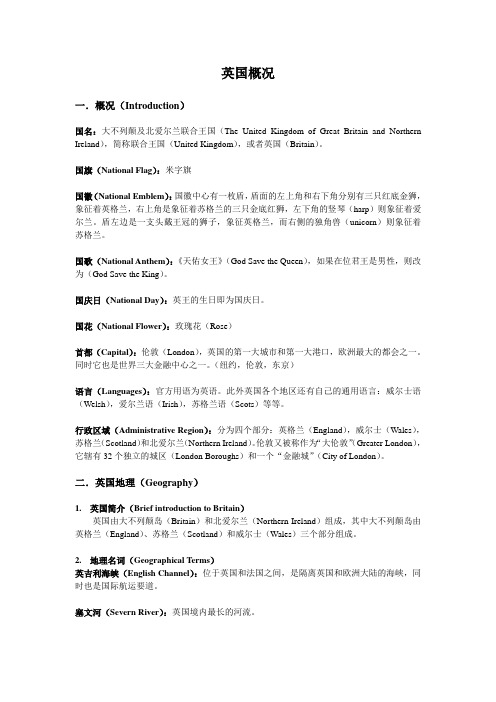
英国概况一.概况(Introduction)国名:大不列颠及北爱尔兰联合王国(The United Kingdom of Great Britain and Northern Ireland),简称联合王国(United Kingdom),或者英国(Britain)。
国旗(National Flag):米字旗国徽(National Emblem):国徽中心有一枚盾,盾面的左上角和右下角分别有三只红底金狮,象征着英格兰,右上角是象征着苏格兰的三只金底红狮,左下角的竖琴(harp)则象征着爱尔兰。
盾左边是一支头戴王冠的狮子,象征英格兰,而右侧的独角兽(unicorn)则象征着苏格兰。
国歌(National Anthem):《天佑女王》(God Save the Queen),如果在位君王是男性,则改为(God Save the King)。
国庆日(National Day):英王的生日即为国庆日。
国花(National Flower):玫瑰花(Rose)首都(Capital):伦敦(London),英国的第一大城市和第一大港口,欧洲最大的都会之一。
同时它也是世界三大金融中心之一。
(纽约,伦敦,东京)语言(Languages):官方用语为英语。
此外英国各个地区还有自己的通用语言:威尔士语(Welsh),爱尔兰语(Irish),苏格兰语(Scots)等等。
行政区域(Administrative Region):分为四个部分:英格兰(England),威尔士(Wales),苏格兰(Scotland)和北爱尔兰(Northern Ireland)。
伦敦又被称作为“大伦敦”(Greater London),它辖有32个独立的城区(London Boroughs)和一个“金融城”(City of London)。
二.英国地理(Geography)1.英国简介(Brief introduction to Britain)英国由大不列颠岛(Britain)和北爱尔兰(Northern Ireland)组成,其中大不列颠岛由英格兰(England)、苏格兰(Scotland)和威尔士(Wales)三个部分组成。
地理国家介绍(英国)

英国主体是英格兰,所以习惯上称英国(本来英国专指英格兰England)。英伦 三岛是指英格兰,苏格兰和威尔士,由于北爱尔兰位于爱尔兰岛,直布罗陀等众 多岛屿面积过小,所以不包括在内。 英国(The United Kingdom)英国是 一个具有多元文化和开放思想的国家。英国的艺术、音乐、文化和饮食一直受到 来自世界各地不同国家的人民和民族习惯的影响,并与许多国家有着悠久而密切 的联系。直到现在,它仍与美国、加拿大、澳大利亚和新西兰等英语国家保持着 牢固的关系。英国是欧盟成员国,25年来,在维护和发展欧盟与中国的关系方 面,它是始终不渝和热心的支持者。英国是欧盟国家在中国最大的投资者。
英国国旗为长方形,长宽之比为2:1的“米”字旗,由深蓝底色和红、 白三色组成。旗中带白边的红色正十字代表英格兰守护神圣乔治,白色 交叉十字代表苏格兰守护神圣安德鲁,红色交叉十字代表爱尔兰守护神 圣帕特里克。此旗产生于1801年,是由原英格兰的白底红色正十旗、苏 格兰的蓝底白色交叉十字旗和爱尔兰的白底红色交叉十字旗重叠而成。
英国位于欧洲,是由不列颠岛(包括英格兰、苏格兰、威尔士)以
英国之最的照片(13张)及爱尔兰岛东北部的北爱尔兰和周围5500个小岛(海外领 地)组成。地理位置北纬50°~58°东经2度到西经7度,属温带海洋性气候。英 国本土位于欧洲大陆西北面的不列颠群岛,被北海、英吉利海峡、凯尔特海、爱 尔兰海和大西洋包围。24.41万平方公里(包括内陆水域),英格兰地区13. 04万 平方公里,苏格兰7. 88万平方公里,威尔士2. 08万平方公里,北爱尔兰1. 36万 平方公里。位于欧洲西部的岛国。隔北海、多佛尔海峡、英吉利海峡与欧洲大陆 相望。它的陆界与爱尔兰共和国接壤。海岸线总长11450公里。全境分为四部分: 英格兰东南部平原、中西部山区、苏格兰山区、北爱尔兰高原和山区。
英国的英文缩写是什么

英国的英文缩写是什么对于英国,我们对于它的英文全称不一定清楚,但是其缩写UK,基本上是知道的。
下面是店铺给大家整理的英国的英文缩写是什么,供大家参阅!英国的英文缩写是什么全称The United Kingdom of Great Britain and Northern Ireland简称UK关于英国的英语作文The Englishman love to behave gentlemanly and the Englishwoman love to behave ladily.They also show their respect to ladies.They always say" Lady first".In their daily life.the English pay attention to their appearance.They dress neatly.They shake hands when they meet other.When they are with others,they usually say "please""thank you""sorry" and so on.The breakfast in Britain is very ually there are all kinds of egg products,oatmeal,bacon,ham,sausages,butter,jam,bread,milk,juic e,coffee and so on.They are popular with the western countries.What's more,the English like drinking tea.They have the habit of drink afternoon tea at about 3 in the afternoon.They enjoy drinking tea and treat it as a kind of seeing friends.关于英国的英语介绍England's full title is "Great Britain and the Northern Ireland united kingdom", by approaches northeast the Europe continent the seacoast British archipelago majority of islands to be composed. She separates North Sea, Straits of Dover and the English Channel faces one another with the Europe continent, is an island country. The English total area approximately 240,000 square kilometers, the population nearly 59 million, according tothe history, the geography and the national character divides into England, Scotland, Wales, the Northern Ireland four parts, English people account for the total population 80%. The English inhabitants mostly believe in the Christianity protestantism, the Northern Ireland area partial inhabitants believe Catholicism. The English winter warm summer is cool, is the oceanity temperate climate.National survey(国家概况)England is the modern times Industrial Revolution place of origin, the official name "the united kingdom", the full title "Great Britain and the Northern Ireland united kingdom (the United Kingdom of Great Britain and Northern Ireland)", the national area altogether 244,000 square kilometers, the inhabitant multi- letters Christianity protestantism, the Northern Ireland area partial inhabitants believe Catholicism, some Englishes also believe in the Islamism, Buddhism, Hinduism, the race, the Judaism and so on.Geographical position(地理位置)The entire boundary by approaches northeast the Europe continent the seacoast British archipelago majority of islands to be composed, separates North Sea, Straits of Dover and the English Channel faces one another with the Europe continent, is an island country. Coastline total length 11,000 kilometers. The east side British island is in the archipelago the biggest islands, also is the English most main national territory. It by the north Scotland, south and the middle England and the north-west Welsh three areas is composed.Climate(气候)England is the oceanity temperate climate, the general winter warm summer is cool.History(历史)Discovered according to the archaeology that, on the British island has the humanity in 3500 ago to live. 5 centuries intermediate stages, large quantities of Date graceful person invade Great Britain by Northern Europe, becomes the nowadays England people the ancestor. But a then Kerr special person part ran away west and north the mountainous area, another part ran away toward Ireland, they are today Wales person, the Scotland person and the Irish person's ancestor. A.D. 6 centuries Christianity starts to spread to Great Britain. In 15 centuries the leaf, the English aristocrats for capture the throne to hit for 30 years "the rose" the civil war. Finally, the economical more developed south earth advocates peace the new aristocrat to win. "All Ze dynasty" from this establishment. In the First World War time, the yingde has become the belligerent country. As a result of the English people's counter- German mood, English king George five th issued an order in 1919, will have the German color "the Hannover dynasty" to change name as "Warm sand dynasty". In 18th century leaf, because politics, the economy and the technical aspect gradually are mature, England has started a industrial revolution. Along with the steam engine invention, each kind of machine use, to 19th century in leaf's Victoria time, England has become in the world the most advanced industrialized country, leaps to the world first place in the production and the trade yeast, everywhere carries out the gunboat policy, captures the marine hegemony, invades the colony, massively plunders other country wealth. Great Britain dominates the world, spreads Europe, Asia, America, Africa, Australia in the overseas control region, is known as "the date not to fall the empire". To 19th century last stages, because country'sand so on America, Germany rises and all that all sorts of reasons, England gradually loses the superiority. Afterwards received the serious wound in Second World War, Great Britain national strength declines day after day. Originally is the native place the Irish island, its south 26 county were separated from the united kingdom in 1921, the overseas colony also in abundance announce the independence after World War II. Great Britain gradually evolves a organization loose British Commonwealth of Nations.英国的全称是“大不列颠和北爱尔兰联合王国”的坐落在欧洲大陆的东北海岸的群岛英属群岛大部分组成.她分开北海,多佛海峡和英吉利海峡相望的欧洲大陆另一个是一个岛国.英语总面积约240,000平方公里,人口近59万美元,根据历史,地理和民族品格进入英格兰,苏格兰,威尔士,北爱尔兰四个部分划分,英国人占了总人口的80%.英语的居民大部分是在基督教新教相信,北爱尔兰地区部分居民信天主教.英语冬暖夏凉,是海洋性温带气候.全国调查(国家概况)英国是近代工业革命的起源,正式名称为“联合王国”,全称“大不列颠和北爱尔兰联合王国(大不列颠及北爱尔兰联合王国)”,全国发生面积共244,000平方公里,居民多信基督教新教,北爱尔兰地区部分居民信天主教,一些英语的也相信,在伊斯兰教,佛教,印度教,种族,犹太教等.地理位置(地理位置)方法全境由欧洲大陆的东北部海岸的群岛英属群岛大部分组成,隔北海,多佛海峡和英吉利海峡相望的欧洲大陆,另一个是一个岛国.海岸线总长度1.1万公里.东面的大不列颠岛是群岛中最大的岛屿,也是英国最主要的国土.它是由苏格兰北部,南部和英格兰中部和西北部的威尔士三个地区组成.气候(气候)英国是海洋性温带气候,冬季温暖的夏季一般是凉爽.历史(历史)据考古发现是,在英国岛屿有3500年前的人类生活. 5世纪中期,优美的日期大量侵入人的大北欧英国,成为现今英格兰人的祖先.但当时克尔特别的人跑了部分西部和北部山区,另一部分爱尔兰跑向了,他们是今天的威尔士人,苏格兰和爱尔兰人的人的祖先.公元6世纪基督教开始蔓延到英国.在15世纪叶,英国贵族为捕捉王位打了30年“玫瑰”内战.最后,经济较发达的南方大地主张和平的新贵族取胜. “所有泽王朝”从此确立.在第一次世界大战期间,英德已成为好战的国家.作为的英国人民的反德情绪的结果,英国国王乔治五日发出的命令在1919年,将有德国色彩的“汉诺威王朝”改变为“温暖的沙子王朝”的名字.在18世纪的一页,因为政治,经济和技术方面逐步成熟,英国已开始了工业革命.随着蒸汽机的发明,各种机械用一种,在叶的维多利亚时间19世纪,英国已成为世界上最先进的工业化国家,跃居世界生产和贸易的酵母首位,到处进行炮舰政策,抓住了海上霸权,侵占殖民地,大量掠夺其他国家财富.英国主宰世界,在海外传播控制地区的欧洲,亚洲,美洲,非洲,澳洲,为“日不落帝国”之称.到了19世纪的最后阶段,由于国家和等美国,德国上升和所有种种原因,英国逐渐失去优势.后来收到了在第二次世界大战后伤口严重的一天,英国国力下降的一天.原来是本土的爱尔兰岛,其南部的26个县进行分离,从英国在1921年,海外殖民地也纷纷宣布第二次世界大战后独立.英国一个组织松散的逐渐演变英联邦.。
英国国家课程标准

The national curriculum, a guide from 1. OverviewThe ‘basic’ school curriculum includes the ‘national curriculum’,religious education and sex education.The national curriculum is a set of subjects and standards used by primary and secondary schools so children learn the same things. It covers what subjects are taught and the standards children should reach in each subject.Other types of school like academies and private schools don’t have to follow the national curriculum. Academies must teach a broad and balanced curriculum including English, maths and science. They must also teach religious education.Key stagesThe national curriculum is organised into blocks of years called ‘key stages’ (KS). At the end o f each key stage, your child’s teacher will formally assess their performance to measure your child’s progress.Levels of attainmentFor each subject there’s a ‘programme of study’. It describes what children should learn. There are also ‘attainment targets’ - usually split into 8 levels for each subject. You’ll get a school report at the end of the year telling you what level your child is at. Read more about what children will learn.2. Key Stage 1 & 2Compulsory national curriculum subjects at primary school are:•English•maths•science•design and technology•history•geography•art and design•music•physical education (PE), including swimming•information and communication technology (ICT)Schools can develop their own ICT curricula or follow the programmes of study. They must also provide religious education (RE)but children don’t have to study it.Schools often also teach:•personal, social and health education (PSHE)•citizenship•modern foreign languagesTests and assessmentsYear 1 phonics screening checkThe check will take place in June when your child will read 40 words out loud to a teacher. You’ll find out how your child did, and their teacher will assess whether he or she needs extra help with reading. If your child doesn’t do well enough in the check they’ll have to do it again in Year 2.Key Stage 1Key Stage 1 tasks and tests cover:•reading•writing•speaking and listening•maths•scienceThe tasks and tests are taken when the school chooses.Your child’s teacher will use the child’s work (including spoken work and homework) to work out what level your child is at in each area.You can ask for the results but they’re only u sed to help the teacher assess your child’s work.Key Stage 2Key Stage 2 tests cover:•English reading•English grammar, punctuation and spelling•maths (including mental arithmetic)The tests are taken in mid-May and last under 5.5 hours in total. You’ll get the results in July. If your child is demonstrating higher achievement then the headteacher may put them in for extra tests.When your child reaches the end of Key Stage 2 the teacher will also give reports on your child’s progress in English, maths an d science.3. Key Stage 3 & 4Key Stage 3Compulsory national curriculum subjects are:•English•maths•science•history•geography•modern foreign languages•design and technology•art and design•music•physical education•citizenship•information and communication technology (ICT)Schools can develop their own ICT curricula or follow the programmes of study.They must also provide religious education (RE) and sex education from Key Stage 3.Key Stage 4During Key Stage 4 most pupils work towards national qualifications - usually GCSEs. The compulsory national curriculum subjects are the ‘core’ and ‘foundation’ subjects. Core subjects are:•English•maths•scienceFoundation subjects are:•information and communication technology (ICT)•physical education•citizenshipSchools must also offer at least 1 subject from each of these areas:•arts•design and technology•humanities•modern foreign languagesThey must also provide religious education (RE) and sex education at Key Stage 4. Pupils don’t have to take exams in religious studies but schools must provi de at least 1 course where pupils can get a recognised RE qualification at Key Stage 4 and above.4. Other compulsory subjectsChildren must also study:•careers education (year 9 onwards)•sex and relationships education (year 7 onwards)•religious education (RE)They may not have to take exams in these subjects.Sex and relationship educationSex and relationship education (SRE) is compulsory from age 11 onwards. It involves teaching children about reproduction, sexuality and sexual health. It doesn’t promot e early sexual activity or any particular sexual orientation.Some parts of sex and relationship education are compulsory - these are part of the national curriculum for science. Parents can withdraw their children from all other parts of sex and relationship education if they want.All schools must have a written policy on sex education, which they must make available to parents for free.Religious educationSchools have to teach RE but parents can withdraw their children for all or part of the lessons. Pu pils can choose to withdraw themselves once they’re 18.Local councils are responsible for deciding the RE syllabus, but faithschools and academies can set their own.Last updated: 8 November 2013。
英语国家概况 英国 UK
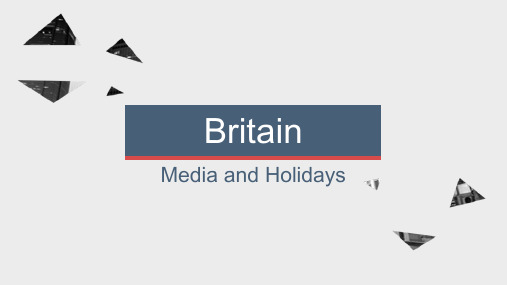
FIVE
The Five is a British crime drama television series.
Channel 4 is a British public-service television broadcaster that began transmission on 2 November 1982.
The British Broadcasting Corporation (BBC) is a British public service broadcaster.
It is headquartered at Broadcasting House in London, and is the world's oldest national broadcasting organisationand the largest broadcaster in the world by number of employees.
3 1999 The Guardian Unlimited Net work of websites launched.
4 2004 The digital edition of the Guardian was launched
Features
The newspaper focuses on international news, 1 specializing in commentary and analytical feature
Mostly intellectual, politicians and white-collar workers,most of them are aged over 21.In the European intelligentsia, the Guardian is more influential than any other newspaper.
英国国家概况(一)(中英文版)
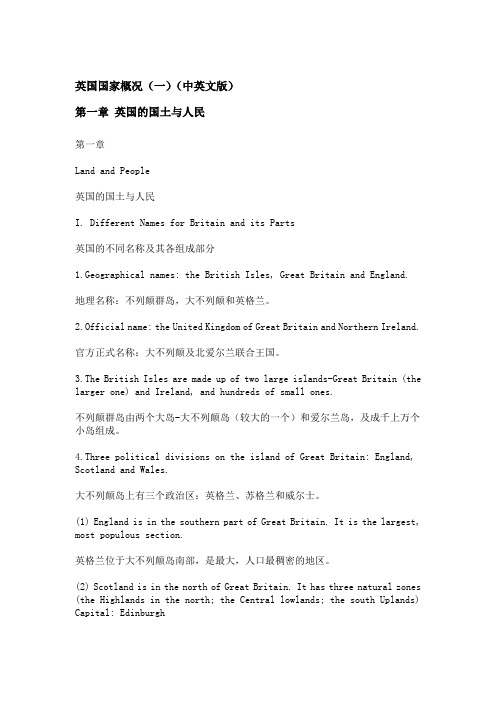
英国国家概况(一)(中英文版)第一章英国的国土与人民第一章Land and People英国的国土与人民I. Different Names for Britain and its Parts英国的不同名称及其各组成部分1.Geographical names: the British Isles, Great Britain and England.地理名称:不列颠群岛,大不列颠和英格兰。
2.Official name: the United Kingdom of Great Britain and Northern Ireland.官方正式名称:大不列颠及北爱尔兰联合王国。
3.The British Isles are made up of two large islands-Great Britain (the larger one) and Ireland, and hundreds of small ones.不列颠群岛由两个大岛-大不列颠岛(较大的一个)和爱尔兰岛,及成千上万个小岛组成。
4.Three political divisions on the island of Great Britain: England, Scotland and Wales.大不列颠岛上有三个政治区:英格兰、苏格兰和威尔士。
(1) England is in the southern part of Great Britain. It is the largest, most populous section.英格兰位于大不列颠岛南部,是最大,人口最稠密的地区。
(2) Scotland is in the north of Great Britain. It has three natural zones (the Highlands in the north; the Central lowlands; the south Uplands) Capital: Edinburgh苏格兰位于大不列颠的北部。
英国国家概况_
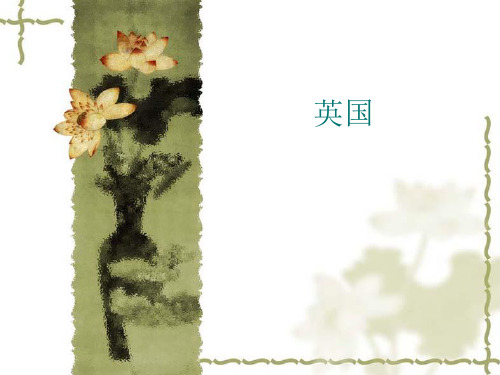
英国文化 英国是世界文化大国之一,文化产业发达。 全国约有2500家博物馆和展览馆对外开 放,其中大英博物馆、国家美术馆等闻名于 世。英国皇家芭蕾舞团、伦敦交响乐团等艺 术团体具有世界一流水准。每年举行约50 0多个专业艺术节,其中爱丁堡国际艺术节 是世界上最盛大的艺术节之一。当今世界8 0%的信息以英语传播。
英国国花:玫瑰花 .
英国,对于蔷薇、月季、玫瑰这三种花来说,人们总把它搞混, 它们虽同科同属,但却并不完全相同,但人们似乎比较偏爱玫瑰 这个词,所以把这三种花统称为玫瑰了。 在英国及欧美许多国家,都把玫瑰(月季)定为国花,以表示亲爱, 又因茎上有刺,表示严肃。基督教中,相传耶稣被出卖后,被钉 在十字架上,鲜血滴在泥土中,十字架下便生长出玫瑰花。 红玫瑰象征了爱情,这可能是世界通用的花语。相传爱神为了救 她的情人,跑得太匆忙,玫瑰的刺划破了她的手脚,鲜血染红了 玫瑰花。红玫瑰因此成了爱情的信物。 古波斯诗人在诗中曾说:神用玫瑰花加蛇、鸽子、蜂蜜、死海的 水、苹果、泥土混在一起,捏出了女人。 在这战争中,双方分别以红、白蔷薇作为标帜。英国人为了纪念 这个事迹,就以蔷薇作为国花了。蔷薇色泽艳丽,一年四季都会 开花。象徵高贵与恒久,所以,英国人又把它当作皇室的徽帜。 英国(England )的国花叫Tudor Rose是红白两种蔷薇合在一起 创造出来的人工花在自然界是没有的。
文化
英国是世界文化大国之一,文化产业发达。全国约 有2500家博物馆和展览馆对外开放,其中大英 博物馆、国家美术馆等闻名于世。英国皇家芭蕾舞 团、伦敦交响乐团等艺术团体具有世界一流水准。 每年举行约500多个专业艺术节,其中爱丁堡国 际艺术节是世界上最盛大的艺术节之一。当今世界 80%的信息以英语传播。 1840年5月6日,世界上第一枚邮票在英国诞 生。英国发行了世界上第一批邮票。这批邮票的发 明者是英国人罗兰· 希尔,邮票的票面是黑色的,上 面印着英国维多利亚女王的浮雕像,每枚面值1便 士,人们称它为“黑便士邮票”。后来人们把这一 天称为邮票诞生日。 联合国教科文组织命名英国格拉斯哥为“音乐 之城”
英国简介
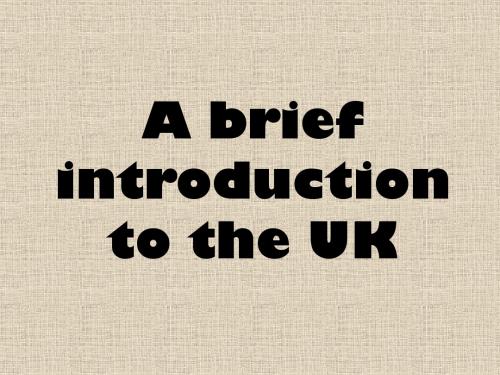
Gas
Discovered under the North Sea during the 1960s and new supplies are still being found today.
remains of animals and plants covered by layers of mud and soil which eventually turn to rock and trap the remains beneath the rock pressure and heat
3. The warm current-the North Atlantic Drift passes the western coast of the great British Isles and warms them.
Natural Resources
Coal Oil and Natural Gas Limestone, Iron and Tin Water Resources
coal/oil/natural gas
Limestone, Iron and Tin
Water Resources
P8
population
90% of the population is urban and only 10% is rural.
Administrative Division Population ( 2004) Area Size (sq km) Population density (people per sq km)
British Characters
Arrogance Conservativeness Sense of humor Politeness
各国药监局官网
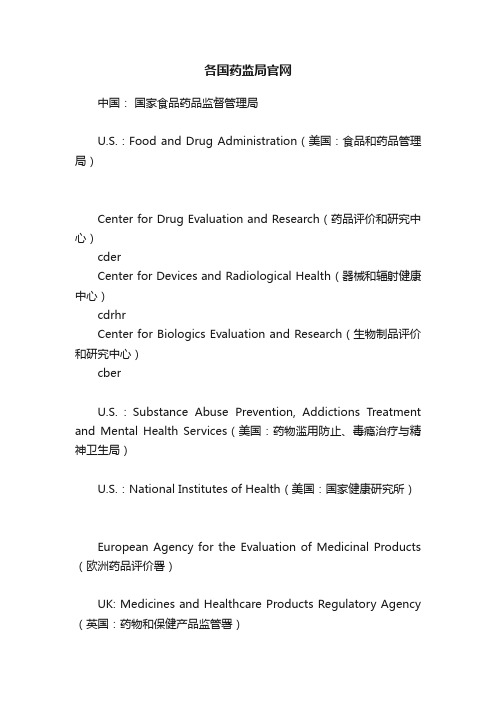
各国药监局官网中国:国家食品药品监督管理局U.S.:Food and Drug Administration(美国:食品和药品管理局)Center for Drug Evaluation and Research(药品评价和研究中心)cderCenter for Devices and Radiological Health(器械和辐射健康中心)cdrhrCenter for Biologics Evaluation and Research(生物制品评价和研究中心)cberU.S.:Substance Abuse Prevention, Addictions Treatment and Mental Health Services(美国:药物滥用防止、毒瘾治疗与精神卫生局)U.S.:National Institutes of Health(美国:国家健康研究所)European Agency for the Evaluation of Medicinal Products (欧洲药品评价署)UK: Medicines and Healthcare Products Regulatory Agency (英国:药物和保健产品监管署)UK: Medical Devices Agency(英国:医疗器械署)UK: National Institute for Biological Standards and Control (英国:国家生物学标准和管制所)Ukraine: Ministry of Health(乌克兰:卫生部)Sweden: Medical Products Agency(瑞典:药品署)Spain: Spanish Drug Agency(西班牙:西班牙药物署)India: Agricultural and Processed Food Products Export Development Authority(印度:农产和加工食品出口发展局)India: Ministry of Health and Family Welfare(印度:卫生和家庭福利部)India: Ministry of Food Processing Industries(印度:食品加工产业部)India: Ministry of Consumer Affairs, Food & Public Distribution(印度:消费者事务、食品和公共分配部)Turkey: Ministry of Health(土耳其:卫生部)Switzerland: Federal Veterinary Office(瑞士:联邦兽医办公室)Switzerland: Agency for Therapeutic Products(瑞士:治疗产品署)Switzerland: Federal Office of Public Health(瑞士:联邦公共卫生办公室)Sweden: National Board of Health and Welfare(瑞典:国家卫生与福利委员会)Spain: Ministry of Health and Consumption(西班牙:卫生与消费部)Slovenia: Institute of Public Health(斯洛文尼亚:公共卫生所)Slovenia: Ministry of Public Health(斯洛文尼亚:公共卫生部)Slovak Republic: State Institute for Drug Control(斯洛伐克共和国:国家药物管制所)San Marino: Ministry of Health and Social Security(圣马力诺:卫生与社会保障部)Papua New Guinea: Department of Health(巴布亚新几内亚:卫生部)Philippines: Department of Health(菲律宾:卫生部)Singapore: Health Sciences Authority(新加坡:卫生科学局)Sri Lanka: Ministry of Health ,Nutrition & Welfare(斯里兰卡:卫生、营养和福利部)Thailand: Food and Drug Administration(泰国:食品药品管理局)New Zealand: Medicines and Medical Devices Safety Authority(新西兰: 药物和医疗器械安全局)Korea: Food and Drug Administration(韩国:食品药品管理局)Malaysia: National Pharmaceutical Control Bureau(马来西亚:国家药品管制局)Japan: Pharmaceuticals and Medical Devices Evaluation Center(日本:药品和医疗器械评价中心)Indonesia: Ministry of Health(印尼:卫生部)Russian Federation: Ministry of Public Health(俄罗斯:公共卫生部)Romania: Ministry of Health and the Family(in Romanian)(罗马尼亚:卫生与家庭部)Portugal: Ministry of Health(葡萄牙:卫生部)Poland: Drug Institute(波兰:药物所)Poland: Ministry of Health and Social Security(波兰:卫生与社会保障部)Norway: Norwegian Medicines Agency(挪威:挪威药物署)Netherlands: Inspectorate for Health Protection and Veterinary Public Health(荷兰:健康保护和兽医公共卫生检查处)Netherlands: Medicines Evaluation Board(荷兰:药物评价委员会)Netherlands: Ministry of Health, Welfare and Sport(荷兰:卫生、福利与体育部)Malta: Ministry of Health(马耳他:卫生部)Luxembourg: Ministry of Health(卢森堡:卫生部)Lithuania: State Medicines Control Agency(立陶宛:国家药物管制署)Lithuania: Ministry of Health(立陶宛:卫生部)Latvia: State Agency of Medicines(拉脱维亚:国家药物署)http://Italy: National Institute of Health(意大利:国家卫生所)Italy: Ministry of Health(意大利:卫生部)Ireland: Medicines Board(爱尔兰:药物委员会)Ireland: Department of Health and Children(爱尔兰:卫生与儿童部)Iceland: Environmental and Food Agency(冰岛:环境与食品署)Iceland: Medicines Control Agency(冰岛:药物管制署)Hungary: National Institute of Pharmacy(匈牙利:国家药房所)Hungary: Ministry of Health, Social and Family Affairs(匈牙利:卫生、社会与家庭事务部)Greece: Hellenic Food Authority(希腊:希腊食品局)Greece: National Organization for Medicines(希腊:国家药物组织)Greece: Ministry of Health and Welfare(希腊:卫生与福利部)Germany: Federal Institute for Drugs and Medical Devices (德国:联邦药物与医疗器械所)Germany: Ministry of Health(德国:卫生部)Georgia: Ministry of Labor, Health and Social Security(格鲁吉亚:劳动、卫生和社会保障部)France: National Agency for Veterinary Medicinal Products (法国:国家兽用药品署)France: General Directorate of Competition, Consumption and Repression of Fraud(food control)(法国:竞争、消费和抑制欺诈总理事会[食品管制])France: Sanitary Safety of Health Products Agency(法国:健康产品卫生安全署)France: Ministry of Health(法国:卫生部)Finland: National Food Agency(芬兰:国家食品署)http://Finland: National Agency for Medicines(芬兰:国家药物署)Finland: Ministry of Social Affairs and Health(芬兰:社会事务和卫生部)Denmark: Veterinary and Food Administration(丹麦:兽医和食品管理局)Estonia: State Agency of Medicines(爱沙尼亚:国家药物署)Denmark: Medicines Agency(丹麦:药物署)Denmark: Ministry of Health(丹麦:卫生部)Czech Republic: State Institute for Drug Control(捷克共和国:国家药物管制所)Czech Republic: Ministry of Health(捷克共和国:卫生部)Croatia: Ministry of Health(克罗地亚:卫生部)Bulgaria: Drug Agency(保加利亚:药物署)Bulgaria: Ministry of Health(保加利亚:卫生部)Belgium: Federal Agency for the Safety of the Food Chain (比利时:联邦食物链安全署)Belgium: Pharmaceutical Inspectorate(比利时:药品检查处)Austria: Secretariat of Health(奥地利:卫生秘书处)Armenia: Drug and Medical Technology Agency(亚美尼亚:药物和医学技术署)Armenia: Ministry of Health(亚美尼亚:卫生部)Andorra: Ministry of Health and Welfare (安道尔:卫生与福利部)United Arab Emirates: Federal Department of Pharmacies (阿拉伯联合酋长国:联邦药房部)United Arab Emirates: Ministry of Health(阿拉伯联合酋长国:卫生部)Saudi Arabia: Ministry of Health(沙特阿拉伯:卫生部)Palestinian Authority: Ministry of Health(巴勒斯坦:卫生部)Lebanon: Ministry of Health(黎巴嫩:卫生部)Jordan: Ministry of Health(约旦:卫生部)Israel: Ministry of Health(以色列:卫生部)Zimbabwe: Ministry of Health and Child Welfare(津巴布韦:卫生与儿童福利部)Uganda: Ministry of Health(乌干达:卫生部)Tunisia: Office of Pharmacy and Medicines(突尼斯:药房与药物办公室)http:// www.dpm.tnTunisia: Ministry of Public Health(突尼斯:公共卫生部)Swaziland: Ministry of Health and Social Welfare(斯威士兰:卫生与社会福利部)South Africa: Department of Health(南非:卫生部)南非药品管理局Morocco: Ministry of Public Health(摩洛哥:公共卫生部)Mauritius: Ministry of Health & Quality of Life(毛里求斯:卫生和生活质量部).muKenya: Ministry of Health(肯尼亚:卫生部)Botswana: Ministry of Health(博茨瓦纳:卫生部)Benin: Ministry of Health(贝宁:卫生部)Venezuela: Ministry of Health and Social Development(委内瑞拉:卫生与社会发展部)Uruguay: Ministry of Public Health(乌拉圭:公共卫生部)Trinidad & Tobago: Bureau of Standards(特立尼达和多巴共和国:标准局)Trinidad and Tobago: Ministry of Health(特立尼达和多巴共和国:卫生部)Peru: General Directorate of Pharmaceuticals, Devices and Drugs(秘鲁:药品,器械与药物理事会)Peru: Ministry of Health(秘鲁:卫生部)Panama: Ministry of Health(巴拿马:卫生部)Nicaragua: Ministry of Health(尼加拉瓜:卫生部)Netherlands Antilles: Department of Public Health and Environmental Protection(荷兰安的列斯群岛:公共卫生与环境保护部)Jamaica: Ministry of Health(牙买加:卫生部)Guyana: National Bureau of Standards(圭亚那:国家标准局)Guyana: Ministry of Health(圭亚那:卫生部)Guatemala: Ministry of Health(危地马拉:卫生部)El Salvador: Ministry of Public Health and Social Assistance (萨尔瓦多:公共卫生与社会援助部)Ecuador: Ministry of Public Health(厄瓜多尔:公共卫生部)Colombia: INVIMA Instituto Nacional de Vigilancia de Medicamentos y Alimentos(哥伦比亚:INVIMA国家药物和营养警戒所)Colombia: Ministry of Health(哥伦比亚:卫生部)Brazil: National Health Surveillance Agency(巴西:国家卫生监督署)Brazil: Ministry of Health(巴西:卫生部)Bolivia: Ministry of Health and Social Welfare(玻利维亚:卫生与社会福利部)Belize: Ministry of Health(洪都拉斯:卫生部)Argentina: Ministry of Health(阿根廷:卫生部)Argentina: National Administration of Drugs, Foods andMedical Technology(阿根廷:国家药物、食品与医疗技术管理局)ICH的网址欧洲药典委员会。
英国的英文怎么读
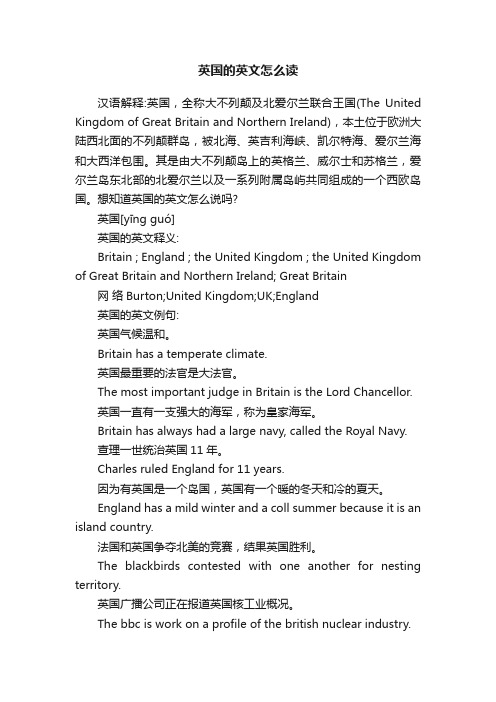
英国的英文怎么读汉语解释:英国,全称大不列颠及北爱尔兰联合王国(The United Kingdom of Great Britain and Northern Ireland),本土位于欧洲大陆西北面的不列颠群岛,被北海、英吉利海峡、凯尔特海、爱尔兰海和大西洋包围。
其是由大不列颠岛上的英格兰、威尔士和苏格兰,爱尔兰岛东北部的北爱尔兰以及一系列附属岛屿共同组成的一个西欧岛国。
想知道英国的英文怎么说吗?英国[yīng guó]英国的英文释义:Britain ; England ; the United Kingdom ; the United Kingdom of Great Britain and Northern Ireland; Great Britain网络Burton;United Kingdom;UK;England英国的英文例句:英国气候温和。
Britain has a temperate climate.英国最重要的法官是大法官。
The most important judge in Britain is the Lord Chancellor.英国一直有一支强大的海军,称为皇家海军。
Britain has always had a large navy, called the Royal Navy.查理一世统治英国11年。
Charles ruled England for 11 years.因为有英国是一个岛国,英国有一个暖的冬天和冷的夏天。
England has a mild winter and a coll summer because it is an island country.法国和英国争夺北美的竞赛,结果英国胜利。
The blackbirds contested with one another for nesting territory.英国广播公司正在报道英国核工业概况。
英语国家概况UK

The United Kingdom of Great Britain and Northern IrelandCountry and PeopleSecond largest Jewish populationThe U.K. consists of four countries∙Englando Capital: Londono The “backbone” of England: The Pennines Mountainso Second longest river: Thameso Origin of the English language▪Language derived from the Normans and Anglo-Saxons ∙Scotlando Capital: Edinburgho Highest Mountain: Ben Neviso Uncommon regional language: Gaelic∙Waleso Capital: Cardiffo Longest river: Severn River (flows from Wales into England)o Official language: Welsh∙Northern Ireland (Ulster)o Capital: Belfasto The Largest Lake: Lough Neagho Uncommon historical language: IrishSocial Structure∙The U.K. is a very class-conscious society.∙Social mobilityo Ability to move up or down in status based on wealth, occupation, education, or some other social variable. The U.K. is a socially mobile society.∙Class Structureo Upper-class▪Wealthy, highly educated, and/or socially distinguished citizens o Middle-class▪Average income earners, educated,o Working-class▪Unskilled to skilled laborerso Underclass▪Homeless and/or long-term unemployed citizensHistoryMain foreign invaders in chronological order∙Romanso Part of the Roman Empire∙The Anglo-Saxonso Germanic tribeso England means “Angle’s Land”∙The Vikingso From northern Europe∙The Normanso Modern-day FranceFeudalism∙The Hundred years Waro Fought between France and Englando Destroyed feudal nobility and brought a new social ordero France lostThe Tudors∙Henry VIIo Seized the crown from King Richard III, becoming the first Tudor monarch ∙Henry VIIIo Created the Church of England, ruled by the monarcho Famous for having six wives∙Edward VIo Henry’s only son, died when he was very young∙Mary Io Restored Catholicism and killed hundreds of Protestantso Known as Bloody Mary∙Elizabeth Io Restored the Church of Englando Ushered in a Golden Age in British Historyo Stopped religious fighting, maintained peace with other nations, expanded trade, developed an open parliament, promoted business, grew the military and tookcontrol of the seasWorld War I∙ A very destructive and expensive war∙Signaled the beginning of the decline of the British EmpireWorld War II∙Led to high unemployment, a devastated infrastructure, and economic collapse in the United Kingdom.∙Signaled the end of the British Empire and the rise of the United States∙Winston Churchill was the Prime Minister during this war∙See World War I and World War II under The United States for more details.Way of LifeRecreation∙Social drinking at a pub is the most common social activity∙Sports originating from the U.K.o Soccer (the national sport), tennis, golf, badminton, boxing, rugby, cricket, snooker, squash, billiards, curling∙Places to go during free timeo Movies, libraries, museums, concerts, sporting events, musicals, plays,∙Like to read magazines and news paperso The Daily Telegraph is considered a “quality” newspaper ∙Television is owned by the governmento Television Channels are numbered: BBC 4, BBC 5, etc. Famous People∙Famous author: J. K. Rowling, Harry Potter series∙Famous band: The Beatles。
- 1、下载文档前请自行甄别文档内容的完整性,平台不提供额外的编辑、内容补充、找答案等附加服务。
- 2、"仅部分预览"的文档,不可在线预览部分如存在完整性等问题,可反馈申请退款(可完整预览的文档不适用该条件!)。
- 3、如文档侵犯您的权益,请联系客服反馈,我们会尽快为您处理(人工客服工作时间:9:00-18:30)。
The National Gallery
• The National Gallery in London, founded in 1824, houses a rich collection of over 2,300 paintings middating from the mid-13th century to 1900in its home on Trafalgar Square.
• The cinema
Early British Cinema
• Modern cinema is generally regarded as descending from the work of the French Lumière brothers in 1895, and their show first came to London in 1896. However, the first moving pictures developed on celluloid(胶片 film 胶片) 胶片 were made in Hyde Park, London in 1889 by a British inventor .
The Natural History Museum
• The Natural History Museum is located in London .The city is home to many museums, galleries, and other institutions. institutions. • The museum is home to life and earth science specimens(标本) (标本) comprising some 70 million items within five main collections
• The museum is a nonnondepartmental public body 赞助) sponsored(赞助) by the Department for Culture, Media and Sport. As with all other national museums and art galleries in the United Kingdom, the Museum charges no admission fee, although charges 征收) are levied(征收) for some temporary special exhibitions
Flag of the United Kingdom
Flag:
Emblem:
Authem:God Save the Queen Bird: European Robin
National flower: red rose
in the UK
• The opera • The museums and art galleries • The cinema
United Kingdom of Great Britain and Northern Ireland
the United Kingdom/the UK
the United Kingdom
The United Kingdom of Great Britain and Northern Ireland (commonly known as the United Kingdom, the UK or Britain) is a sovereign state located off the north-western coast of continental Europe. The country includes the island of Great Britain, the north-eastern part of the island of Ireland and many smaller islands. It is a country in its own right and consists of four countries: England, Northern Ireland, Scotland and Wales
• The United Kingdom has had a large impact on modern cinema and has one of the most respected film industries in the world. Despite a history of successful productions, the industry is characterised by an ongoing debate about its identity and the influences of American and European cinema.
• The current building is the third theatre on the site following disastrous fires in 1808 and 1857. The façade, foyer and auditorium(礼堂) auditorium(礼堂) date from 1858, but almost every other element of the present complex dates from an extensive reconstruction in the 1990s. • The Royal Opera House seats 2,268 people and consists of four tiers of boxes and balconies and amphitheatre( 圆形露天竞技场) the amphitheatre( 圆形露天竞技场) gallery. The auditorium is 12.20 m wide and 14.80 m high. The main auditorium is a Grade 1 listed building.
• The British Museum was established in 1753, largely based on the collections of the physician and scientist Sir Hans Sloane. The museum first opened to the public on 15 January 1759
The Gallery
• An art gallery is a space for the exhibition of art, usually visual art. Museum can be public or private but what distinguishes a Museum is the ownership of a collection. Paintings are the most commonly displayed art objects; however, sculpture, photographs, illustrations, installation art and objects from the applied arts may also be shown.
• A museum is a building or institution which houses a collection of artifacts. • Museums collect and care for objects of scientific, artistic, or historical importance and make them available for public viewing through exhibits that may be permanent or temporary.
The opera
Opera is an art form in which singers and musicians perform a dramatic work (called an opera) which combines a text (called a libretto) and a musical score(乐谱). 乐谱) Opera is part of the Western classical music tradition. Opera incorporates(合并) 合并) many of the elements of spoken theatre, such as acting, scenery (布景)and 布景) costumes(服装,剧装) and sometimes 剧装) includes dance. The performance is typically given in an opera house, accompanied by an orchestra or smaller musical ensemble(合唱曲) . 合唱曲)
The Royal Opera House
• The Royal Opera House is an opera house and major performing arts venue 集合地) (集合地) in the London district of Covent Garden. • Originally called the Theatre Royal, it opened in 1732 and served primarily as a playhouse for the first hundred years of its history.
The museums
The British Museum
• The British Museum is a museum of human history and culture situated in London. Its collections, which number more than seven million objects, are amongst the largest and most comprehensive in the world
